Freedom to Protest Is Under Attack – Why It Matters for Everyone

When states suppress public protests, they don’t just target activists, they erode the rights of all citizens. The latest crackdowns in Hungary, Turkey, and beyond show why defending freedom of assembly is more urgent than ever.
On 8 March, people took to the streets to mark International Women’s Day, but their right to march was actively suppressed in many places. From Kazakhstan to Turkey and Azerbaijan, authorities used intimidation, force, and legal threats to prevent women from gathering, exposing a broader pattern of restrictions on civil society. Meanwhile, in Hungary, the government has escalated its efforts to suppress freedom of assembly, passing a law that explicitly bans Pride marches and introduces surveillance measures to deter participation.
Crackdowns on feminist and LGBTI protests
Ahead of Women’s Day, Kazakhstan authorities detained LBT activists from Feminita, using penal and administrative tactics to suppress their activism. In Turkey, nearly 200 people were detained in Istanbul alone, with police blocking demonstrations across multiple cities on the 8th. Among those detained was a trans woman, underscoring how trans activists are often specifically targeted. In Azerbaijan, feminist activist Rauf Heydarov was sentenced to 30 days of detention after attempting to display a poster on 8 March, with fabricated charges used to justify their arrest. These cases illustrate how states use arbitrary detentions and legal mechanisms to intimidate activists and restrict their right to assemble and protest.
Hungary: From threats to an outright ban on Pride
In Hungary, restrictions on freedom of assembly have intensified dramatically. What started as a “child protection” law—banning the “depiction or promotion” of homosexuality to minors and widely condemned by EU leaders, the European Commission, and the Council of Europe as violating international human rights standards—has now escalated into a nationwide ban on Pride marches. The new law not only criminalises these events but also permits the use of facial recognition technology to track and penalise participants. Despite this, the Budapest Pride organisers remain committed to marching, demonstrating the resilience of the movement in the face of increasing authoritarianism.
A key indicator of democratic health
These events in Hungary, Turkey, Kazakhstan, and Azerbaijan are not isolated incidents. They reflect a broader trend in which governments seek to silence peaceful and legitimate dissent by restricting public demonstrations, targeting women’s rights and LGBTI activists, and using legal measures to suppress fundamental rights. The ability to protest is a key indicator of democratic health. When states criminalise peaceful assembly, they erode not just rights for LGBTI people and women, but the broader foundation of civil liberties for all.
As these threats grow, the international response must be clear. Governments, the EU, and international institutions must hold states accountable for these violations and stand in firm defence of the right to protest. Freedom of assembly is not just an LGBTI or feminist issue; it is central to human rights and democracy. When one group’s right to gather is restricted, the ability of all people to organise and demand change is at risk.
The human right to assemble and protest must be protected, defended, and upheld.
Hungary’s Parliament Passes Law Banning Pride
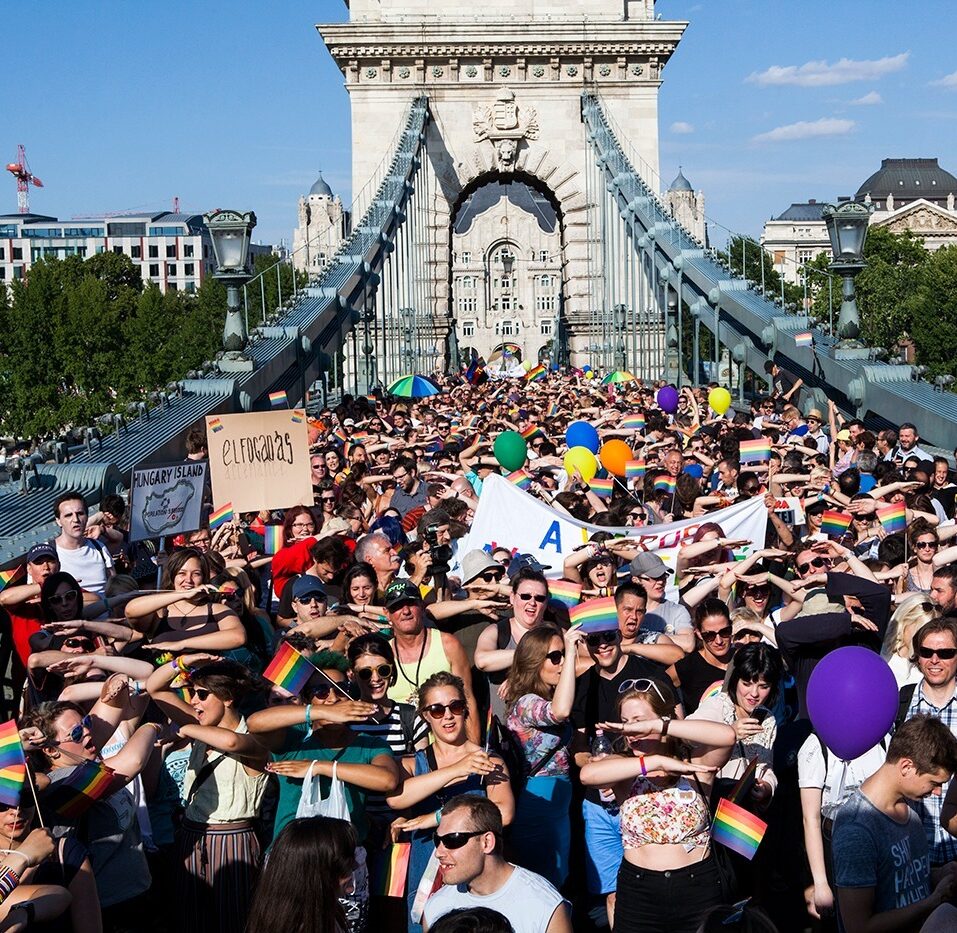
In an attack on freedom of assembly, Hungary’s Parliament has passed a controversial law criminalising Pride marches and allowing the use of facial recognition technology to target participants.
In a deeply troubling development, Hungary’s Parliament has passed a law banning Pride marches across the country. The law was fast-tracked through Parliament in just one day, with no consultation or debate, marking a significant erosion of freedom of assembly and human rights in Hungary.
The newly passed legislation expands Hungary’s already controversial “child protection” law, which prohibits the “depiction or promotion” of homosexuality to minors. This law reinforces harmful and outdated stereotypes about LGBTI individuals and their rights.It takes this one step further by criminalising Pride events, both for organisers and participants, while also granting authorities the power to use facial recognition technology to track, identify, and fine attendees. This measure has been condemned as a significant infringement on privacy and personal freedoms.
According to ILGA-Europe’s Executive Director, Chaber: “This new law is more than just a ban on a single event. It represents an assault on the fundamental freedoms of expression, assembly, and protest, and an attempt to silence the LGBTI community in Hungary. It is an effort to erase LGBTI people from public life and restrict their ability to peacefully protest. More restrictions on the rights of other people will follow.”
The government’s actions have sparked widespread protests. Yesterday, thousands gathered outside Parliament, chanting anti-government slogans. The organisers of Budapest Pride also remain defiant. This year marks the 30th anniversary of the Budapest Pride march, and they are committed to marching on June 28, 2025.
“The international community must rally behind the people of Hungary, demanding the protection of their right to peacefully assemble and protest,” Chaber added. “As Pride marches continue to grow and oppose authoritarianism worldwide, the fight for LGBTI rights becomes even more vital in the broader struggle for democracy and human dignity.”
Joint statement welcoming EU’s top court judgment to correct a trans man’s gender identity data in national registry
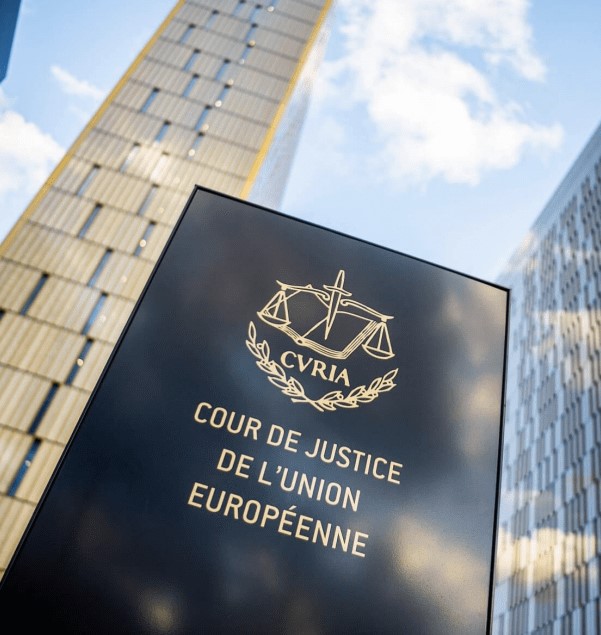
Today, the European Court of Justice (CJEU) issued a judgment in the case of Deldits (C-247/23), stating that national authorities responsible for keeping public registers (such as asylum registers) should correct data on gender identity when it is inaccurately recorded. This decision carries significant implications for advancing human rights protections in the EU, at a time when trans people and human rights in general are under massive attack.
Background
A trans refugee in Hungary seeks legal gender recognition
This case concerns an applicant who was granted refugee status in Hungary based on a well-founded fear of persecution in his country of origin because of his gender identity. The applicant requested the correction of his gender marker and name on the national asylum registry (as it reflected his name and sex at birth) under Article 16 of the EU’s General Data Protection Regulation (GDPR) on the basis that the data was inaccurate.
A legal paradox: Granted asylum but denied recognition
Despite the Hungarian authorities granting the applicant refugee status on this ground, he found himself in a paradox: his gender marker was registered incorrectly, and he could not correct it as there is no legal framework regulating the conditions for legal gender recognition (LGR) in the country.
Hungary’s ban on legal gender recognition
This case is a pivotal moment in the ongoing battle for the rights of trans people in Hungary, which has banned LGR for citizens in 2020, whilst refugees never had access to LGR. Moreover, Hungarian authorities requested proof of surgery as a precondition to change the applicant’s gender marker – a practice that the European Court of Human Rights has declared to be in violation of the right to respect for private and family life as protected by Article 8 of the Convention since 2017.
GDPR and human rights
The case raised several important questions for the CJEU: whether the GDPR mandates the correction of gender markers in national registries upon request. If so, does this request require evidence? If so, does it need to include proof of surgical intervention?
CJEU ruling strengthens trans rights and data accuracy rules
Today’s CJEU ruling addresses these questions, and is very favourable. It confirms that the right to rectification under Article 16 GDPR, taken in conjunction with the principle of data accuracy under Article 5(1)(d) GDPR, require authorities, without undue delay, to correct personal data concerning gender identity which is held in public registers when such data is inaccurate.
Importantly, the Court stated that if the purpose of collecting personal data is to identify the individual, the data should refer to the person’s lived gender identity, and not the identity assigned to them at birth. In that respect, the Court underlined that a Member State cannot invoke the absence of a domestic procedure for LGR to limit the exercise of the right to rectification under GDPR.
Secondly, the Court clarified that a person may need to provide reasonable proof to correct inaccurate data, but Member States cannot require proof of ‘gender reassignment surgery’ “under any circumstances”. The Court stated that such a requirement goes against the right to personal integrity (Article 3) and the right to privacy (Article 7) of the Charter of Fundamental Rights.
The Hungarian authorities must now allow for a change of gender marker in the Asylum Registry and all other national registries. However, instead of patchwork procedures by each data controlling entity in the country, the Hungarian government needs to urgently create legal certainty and set up a legal framework for quick, transparent and accessible procedure for LGR, where individuals can adapt their documents to match with their gender identity. The European Court of Human Rights already found that Hungary violates the European Convention on Human Rights for failing to allow such procedure (R.K. v. Hungary, 2023) including for trans refugees (Rana v Hungary, 2020).
The CJEU ruling is also binding upon national authorities keeping a public register across all EU Member States.
Reactions
TGEU Expert Advisor, Richard Köhler, comments: “Trans people deserve accurate personal data—full stop. Today’s Court ruling sends a clear message: while Member States control legal gender recognition processes, they must respect EU law. Evidence can be requested, but surgical proof? Absolutely forbidden.
This isn’t just about refugees—it’s also about asylum seekers and citizens. Where public records are kept to identify people, Member States need to recognise that a person’s real identity is what matters, not labels given at birth. The Court couldn’t be clearer: surgery requirements and forced sterilisation violate EU data protection law. Now, Member States must take action. No more delays. No more excuses. The message is simple: recognise people’s identities without invasive demands. The EU Commission must support Member States with implementation and take decisive action against those who continue to deny trans people their fundamental rights.“
ILGA-Europe Advocacy Director, Katrin Hugendubel, said: “This judgment is a significant step forward for the rights of trans people, including refugees, in the EU – especially in Member States without any legal framework for LGR. At a time when the rights of trans and LGBTI people in general are under constant threat, we call on Member States to implement this ruling by ensuring that their frameworks for collecting and storing personal data are GDPR and fundamental rights compliant. We also call on the EU Commission to actively monitor the implementation of this judgment and to encourage Member States to bring their frameworks for LGR in line with international human rights and EU law standards.”
According to Gábor Győző, the attorney representing the applicant in the proceedings on behalf of Háttér Society and the Hungarian Helsinki Committee, “it is very important and welcomed that the Court not only addressed the specifics of the case, but also assessed the Hungarian legal framework and the protection of the rights of trans people in a broader context. Moreover, this decision also serves as a guideline for all other Member States on this issue.”
“Trans people have been subject to constant governmental harassment in recent years. The judgment is a ray of hope that they cannot be deprived of their rights and denied their existence,” added Eszter Polgári, Director of the Legal Program of Háttér Society.
Joint calls to action
We call on EU governments to adhere to this CJEU ruling and proactively check their national procedures for a GDPR and European human rights compliant framework that allows individuals to quickly, transparently and in an accessible way update gendered data that is held on them. As EU data protection rules apply to anyone in the EU, they also need to ensure data of asylum seekers alongside refugees can be easily updated to reflect a person’s gender identity.
We call on the EU Commission to monitor the implementation of the Deldits case into national case law and adherence of the national authorities to the final decision. Failure in compliance needs to lead to infringement procedures. National Data Protection Authorities (DPAs) should equally monitor implementation and issue fines for non-compliant data controllers.
For a uniform understanding and application across the EU on both the Deldits and Mousse CJEU case law, we call on the Commission to provide practical guidance and the possibility to exchange for Member States and data controllers on implementation.
As EU data protection rules also apply to private actors, any organisation collecting, storing, or processing personal data on names and gender markers needs to check their processes for allowing correction of the data that they hold.
We urge EU institutions and Member States to ensure trans people have access to quick, transparent and accessible paths to LGR.
Congratulations to everyone involved for this incredible victory. Your efforts and dedication will make a huge impact on trans lives across the EU.
ILGA-Europe and TGEU provided support in the CJEU procedure to Háttér Society, which represented the applicant together with the Hungarian Helsinki Committee in this case.
Context
Today’s judgement comes on the heels of a groundbreaking data protection case strengthening the rights of non-binary people, Mousse (C-394/23). In this judgment, the CJEU found that the collection of gendered civil tiles (Mr/Mrs) when purchasing train tickets by a railway company is not necessary for providing transportation services and hence not compliant with the GDPR principle of data minimisation.
EU data privacy rules
The GDPR is Europe’s powerful privacy law that protects people’s personal data by giving them control over how private and public organisations collect, use and store their information. It applies to all organisations handling EU residents’ data anywhere in the world, and goes far beyond cookie settings—it ensures organisations get proper consent, minimise data collection, secure information properly, and allow people to access, correct, or delete their own data.
Today’s judgment particularly addresses national authorities and public registers. Therefore, it goes beyond asylum registers and may well have implications for national civil registries and how such personal data can be corrected.
The Court reaffirmed that regulation of legal gender recognition continues to be within the remit of Member States, but that they must respect EU data protection and fundamental rights when doing so.
Read Háttér Society’s press release here.
Statement: Orbán’s threat to ban LGBTI Pride marks a dangerous step toward silencing dissent
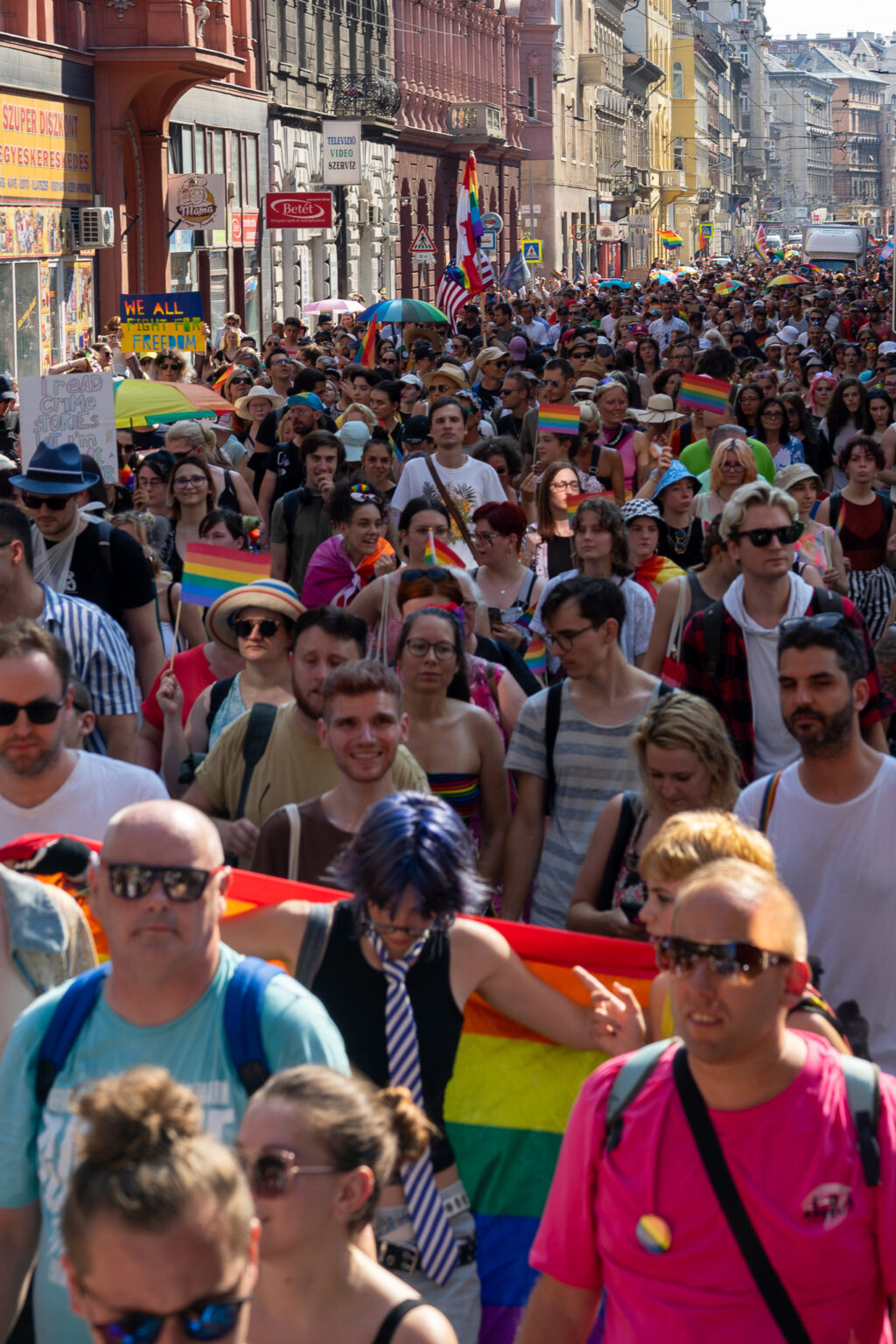
Hungarian Prime Minister Viktor Orbán’s threat to ban the 2025 Budapest Pride march has sparked outrage, with concerns over restrictions linked to the country’s anti-LGBTI law. ILGA-Europe stand in solidarity with the organisers of Budapest Pride, and assert the Hungarian people’s right to peaceful protest.
On 22 February, the Hungarian Prime Minister, Viktor Orbán, delivered a speech in which he threatened to ban Budapest Pride. During his State of the Nation address, Orbán said: “I advise the Pride organisers that they should not bother preparing for this year’s march. It would be a waste of time and money”.
While no legislation has yet been tabled to outright ban the 2025 Pride march, the government has referred to restrictions on its location, justifying this on the basis of the Hungarian anti-LGBTI law adopted in 2021, which bans promotion or portrayal of so-called “divergence from self-identity corresponding to sex at birth, sex change or homosexuality” to minors. This effectively bans depictions or “promotion” of LGBTI identities in the public space or anywhere where minors could be present or see LGBTI related content.
The European Commission has taken Hungary to court over this aforementioned law, and any restrictions or bans on Pride would also contravene laws related to freedom of assembly and freedom of expression, protected in both international law1 and Hungary’s own Constitution2.
Last year, 35,000 people marched, making Budapest Pride the largest recurring civil rights demonstration in the country. Activists anticipate that this year’s march will be Hungary’s largest Pride ever. Many Hungarians who have never attended any Pride marches are publicly declaring their intention to join because the government is threatening a ban.
Banning Pride in Budapest would eliminate a crucial platform for Hungarians to demand that their government listen to its people and uphold democratic values. It would mark a dangerous step toward restricting the right to protest and silencing dissent.
We affirm the value and importance of Pride as a peaceful gathering to assert the equal human rights of LGBTI people, in the context of demanding equal human rights for all. We decry any attempt to stamp out Pride as an attack on everyone’s right to freedom of assembly. We stand in solidarity with Budapest Pride, who will march on June 28, and are determined to fight all obstacles laid in front of them. We urge the authorities in Hungary and every democratic state to respect and protect the right to peaceful assembly. A society that upholds human rights for all is a stronger, more just society for everyone.
Our submission to the EC 2025 Rule of Law report
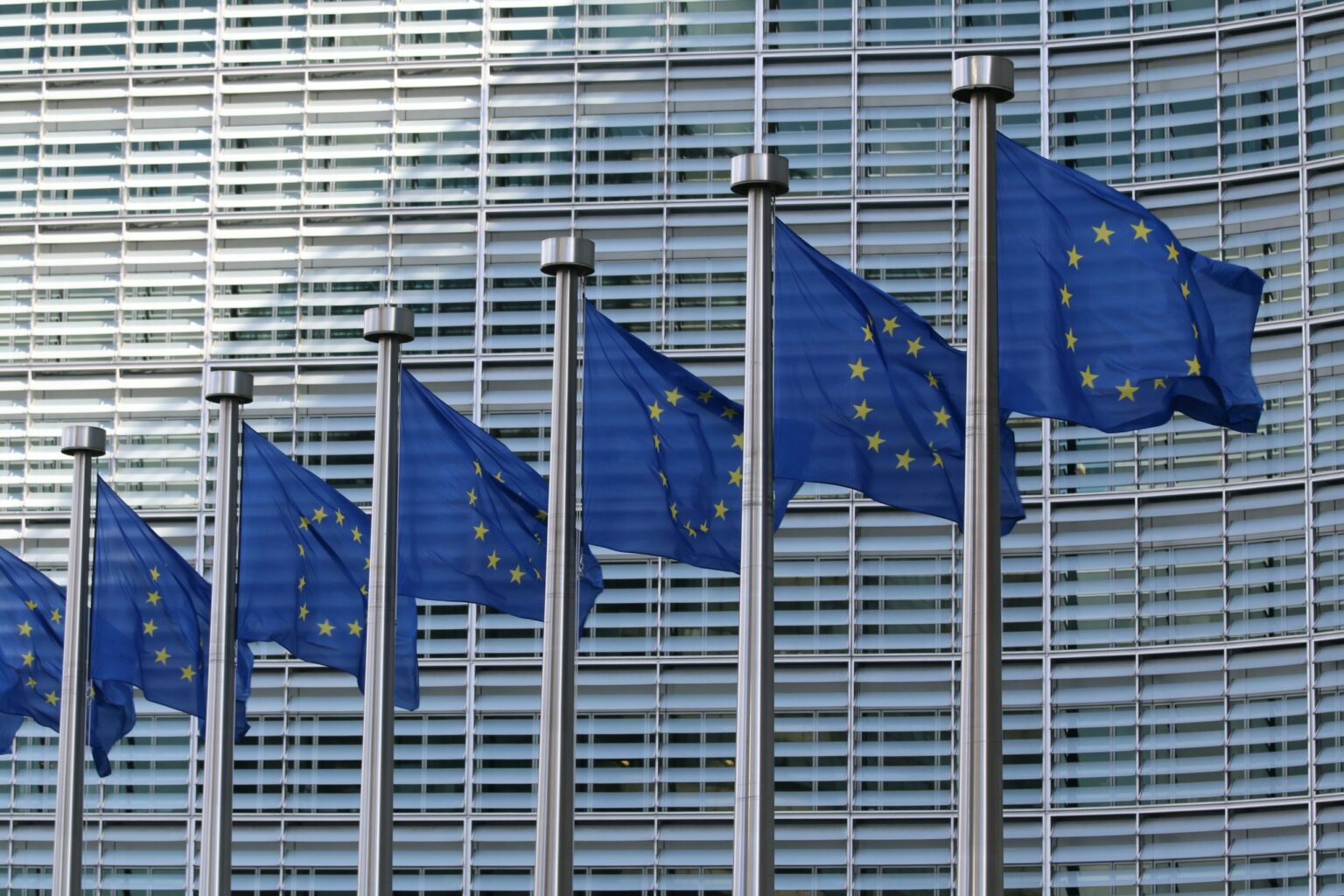
After a year of elections across the EU, threats to democracy and the rule of law are growing both in Europe and globally. Our submission highlights more clearly than ever the connection between these threats and the instrumentalisation of LGBTI people.
Disinformation, hate speech, and discriminatory political discourse have surged in many countries, directly impacting the lives of LGBTI people. At the same time, violence and restrictive legislation against LGBTI individuals are increasing, undermining the rule of law.
EU member states unite against Hungary’s anti-LGBTI propaganda law at infringement hearing
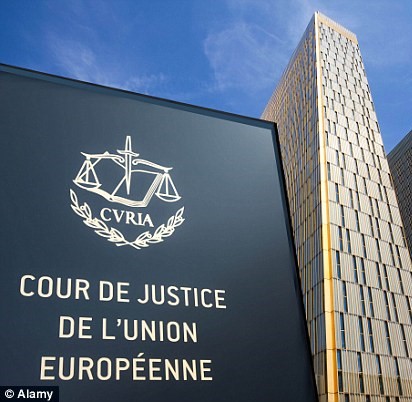
Yesterday, the European Commission was joined by 16 Member States and the European Parliament in a hearing at the court of Justice of the European Union on whether Hungary’s anti-LGBTI Propaganda Act is a violation of EU law.
On November 19, the Court of Justice of the European Union (CJEU) held a hearing in the infringement proceedings against Hungary, initiated by the European Commission over anti-LGBTI legislation introduced in 2021, which censors inclusive sex education, equates LGBTI ‘lifestyles’ with paedophilia, blocks adoption for LGBTI couples, and restricts content in media and advertising.
The Commission stressed that the Hungarian state had seriously and blatantly violated EU law by passing a law that stigmatises the LGBTI community under the guise of “child protection”. This infringement is, in the Commission’s view, systemic, intentional and widespread, and constitutes a violation of Article 2 of the Treaty on European Union (TEU). This provision enshrines the fundamental values of the EU, including the obligation of Member States to respect human dignity, freedom, equality, the rule of law and the rights of persons belonging to minorities.
The hearing was attended by the Hungarian government, the governments of Belgium, Denmark, Germany, Estonia, Ireland, Greece, Spain, Luxembourg, Malta, the Netherlands, Finland, Sweden and the European Parliament.
All the Member States that spoke at the hearing expressed agreement with the Commission’s position that core values are integral to the identity of the European Union. These values represent a shared public order, based on mutual trust, which all Member States have committed to uphold upon their accession. The effective implementation of EU law, and thereby respect for these fundamental values, relies on good faith from the Member States. They argued that this good faith is absent in the case of the Hungarian propaganda law.
Several speakers highlighted the harmful impact of the legislation, pointing out issues such as the absence of sex education in public schools, the censorship of exhibitions, and fines imposed on bookstores. The representative of the Dutch government mentioned that 87.5% of the inquiries the Dutch media authority receives from foreign counterparts come from the Hungarian Media Council, asking about content that is fully accepted in the Netherlands and is considered a normal part of daily life. The Dutch government argued that the ban on LGBTI content in the media is not just a domestic issue for Hungary, but a concern for the entire European Union.
The contested legislation violates rights enshrined in the EU Charter of Fundamental Rights, such as the right to human dignity, freedom of expression, the right to private and family life and the prohibition of discrimination. As several Member States also noted, the law runs counter to the European Court of Human Rights’ judgement condemning the 2013 Russian anti-LGBT law, which said: “by adopting such laws, the authorities promote stigmatisation and prejudice and encourage homophobia, which is incompatible with the concepts of equality, pluralism and tolerance in democratic societies.”
According to Eszter Polgári, Head of the Legal Programme of Háttér Society, an NGO representing LGBTI people in Hungary: “The infringement proceedings against the Hungarian anti-LGBTQI legislation have become the largest human rights case in the EU, where the Court of Justice has to decide not only on the violation of the relevant sectoral directives, but also on whether the stigmatising and exclusionary legislation against sexual and gender minorities violates the EU’s fundamental values. If it answers yes to the latter, it will send a clear message to all Member States: no minority group, including the LGBTQI community, should be used for political purposes and demonised.”
Katrin Hugendubel, Advocacy Director at ILGA-Europe added: “Yesterday’s hearing was a key moment in our common efforts against the Hungarian anti-LGBTI law, as well as similar laws that are being proposed or in force across the EU. We were heartened to see the clear comments made by the European Commission and member states, rightly condemning Hungary’s anti-LGBTI law as a violation of EU law and making it clear that member states can no longer act against human rights with impunity, nor can governments go on instrumentalising minorities for political gains without being held accountable. A strong judgement in this case will send a strong message to other member states who have been adopting or keep proposing similar laws violating fundamental rights, making clear that they can no longer act against human rights with impunity.”
The Advocate General will deliver his opinion on the case on 5 June 2025.
Read Háttér Society’s press release on the hearing (in Hungarian) here.
Joint statement: EU Court of Justice Advocate General calls on Hungary to correct trans refugee’s gender marker in national registries
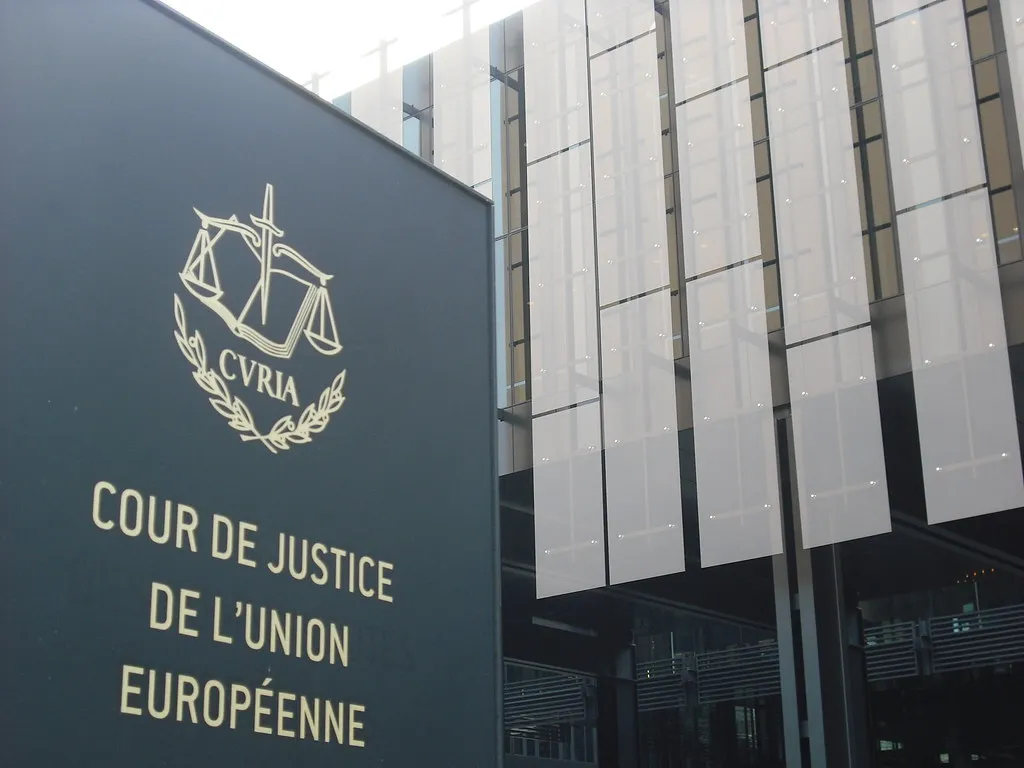
Háttér Society, ILGA-Europe and TGEU welcome an opinion from the Advocate General of the Court of Justice of the European Union stating that Hungarian immigration authorities must correct the gender marker of a trans person in its national immigration registries upon request.
Today, the Advocate General of the Court of Justice of the European Union (CJEU) has issued an opinion on the case of Deldits (C-247/23) calling on Hungary to correct the gender marker of the applicant in the national immigration registry upon request.
The opinion specifically relates to the case of a trans refugee in Hungary who has been denied legal gender recognition (LGR) in the asylum register since 2021. Represented by Háttér Society and the Hungarian Helsinki Committee, the complainant, who was granted refugee status in Hungary in 2014, has sought the rectification of his gender marker and name (as it reflected his sex at birth) on the national registry under Article 16 of the EU’s General Data Protection Regulation (GDPR).
This case raises crucial questions for the CJEU: whether the GDPR mandates the rectification of the gender marker on national registries upon request, and if so, does this request require evidence? If so, does it need to include proof of surgical intervention?
Advocate General Collins stated that following Article 16 GDPR in conjunction with Article 5(1)(d) GDPR Hungarian authorities need to rectify the gender of the applicant, whose data they recorded inaccurately in the first place. He also pronounced that while evidence might be requested, proof of surgical intervention cannot be required.
This case marks a pivotal moment in the ongoing battle for the rights of trans people in Hungary. The 2018 Constitutional Court decision and the 2020 European Court of Human Rights judgment affirmed the right of trans refugees to legal gender recognition. Nonetheless, the Hungarian legislature has not implemented the necessary changes. Hungarian citizens have not had access to LGR since May 2020, whilst refugees never had access to such recognition.
Eszter Polgári, Director of the Legal Program at Háttér Society, emphasised the potential implications of a ruling in line with the opinion: “The preliminary ruling reflecting the Advocate General’s opinion might have an impact beyond the specific case, as a positive decision of the Court of Justice of the European Union will hopefully force the legislator to reconsider the procedure on legal gender recognition also for Hungarian citizens, and bring it in line with international human rights and EU law, including the relevant provisions of the GDPR.”
TGEU Expert Advisor, Richard Köhler, adds: “Respect and recognition matter for everyone. For many trans people it is a significant step to living fulfilling lives. The Advocate General’s opinion is a substantial move towards EU Member States finally recognising their responsibility to introduce proper legal gender recognition procedures for all trans people.”
ILGA-Europe Senior Strategic Litigation Officer, Marie-Hélène Ludwig, said: “This opinion is a significant development for the rights of trans people in the EU, including refugees, particularly in countries still deprived of any legal framework for legal gender recognition, in breach of their international obligations. We are looking forward to the judgment confirming Member States’ obligation to record correct gender markers in all national registries.”
The Advocate General at the Court of Justice of the European Union offers independent, expert legal opinions on cases to guide the judges in making their final decisions.
The CJEU’s decision is expected at the beginning of 2025. It holds significant potential to influence the legal protections for trans people within Hungary and across the EU.
ILGA-Europe and TGEU – Trans Europe and Central Asia are providing support to Háttér Society in this case.
What the EU Election Results Will Mean for LGBTI Human Rights
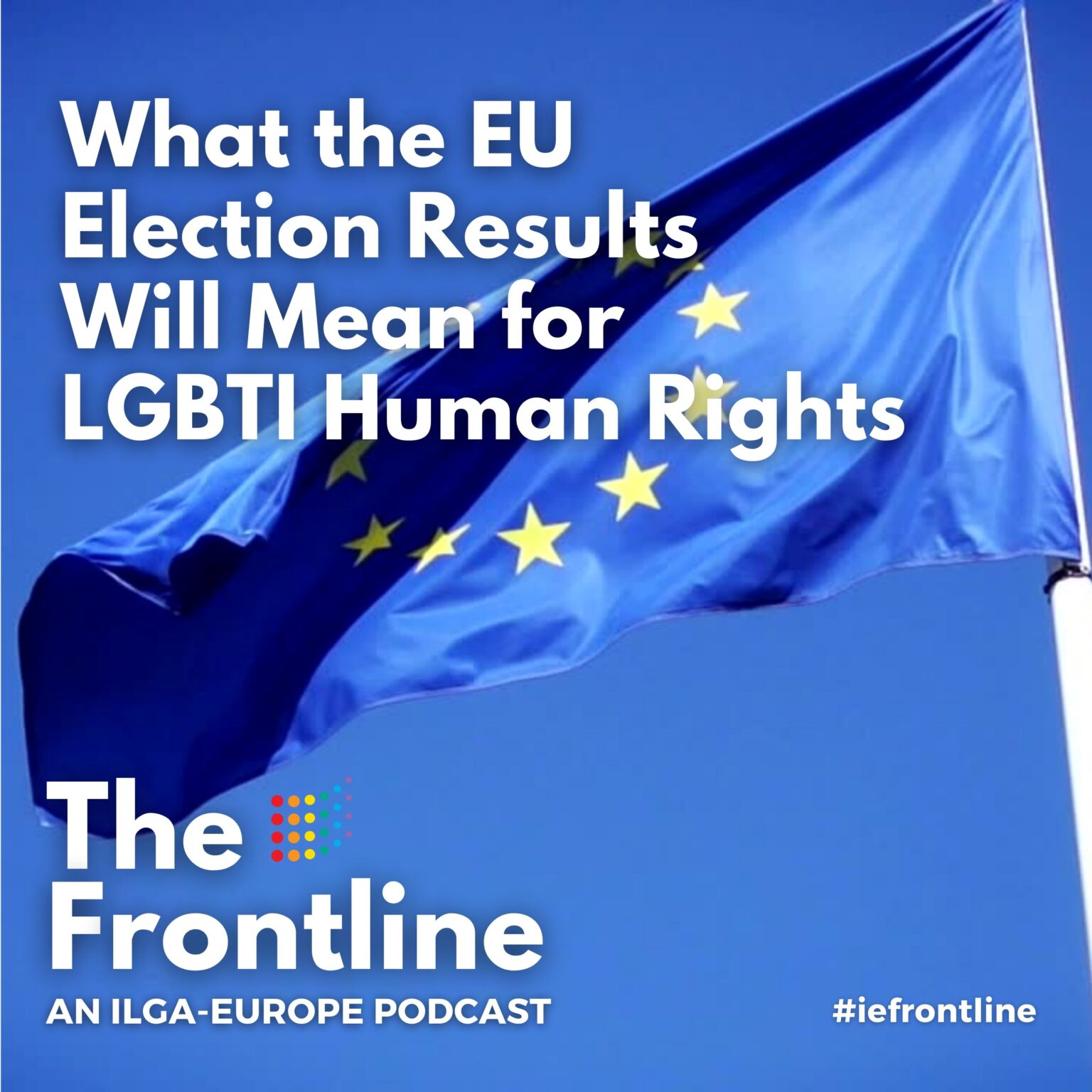
In our special post-European elections podcast, we sit down with MEP’s from the LGBTI Intergroup at the European Parliament and activists from Italy and Hungary to discuss how the outcomes, both on the European and national levels will play out for LGBTI human rights in the EU and beyond.
Although the swing to the far right predicted in the European elections hasn’t been as radical as expected, with the progressive and centre-right still holding a majority of seats, there have been seismic shifts to the right in a number of member states, including Germany, France and Austria.
In this episode of The Frontline we take a look at that this might all mean for LGBTI human rights in the EU over the coming years. Joining our Advocacy Director, Katrin Hugendubel to discuss the election results, the campaigns that led to them, and what the way forward might be are are co-chairs of the LGBTI Intergroup at the European parliament, freshly re-elected MEP’s Marc Angel from the Socialists & Democrats in Luxembourg and Kim van Sparrentak from the Greens/EFA in The Netherlands, alongside activists Luca Dudits from Hatter Society in Hungary and Roberto Muzetta from Arcigay in Italy.
Our submission to the EC 2024 Rule of Law report
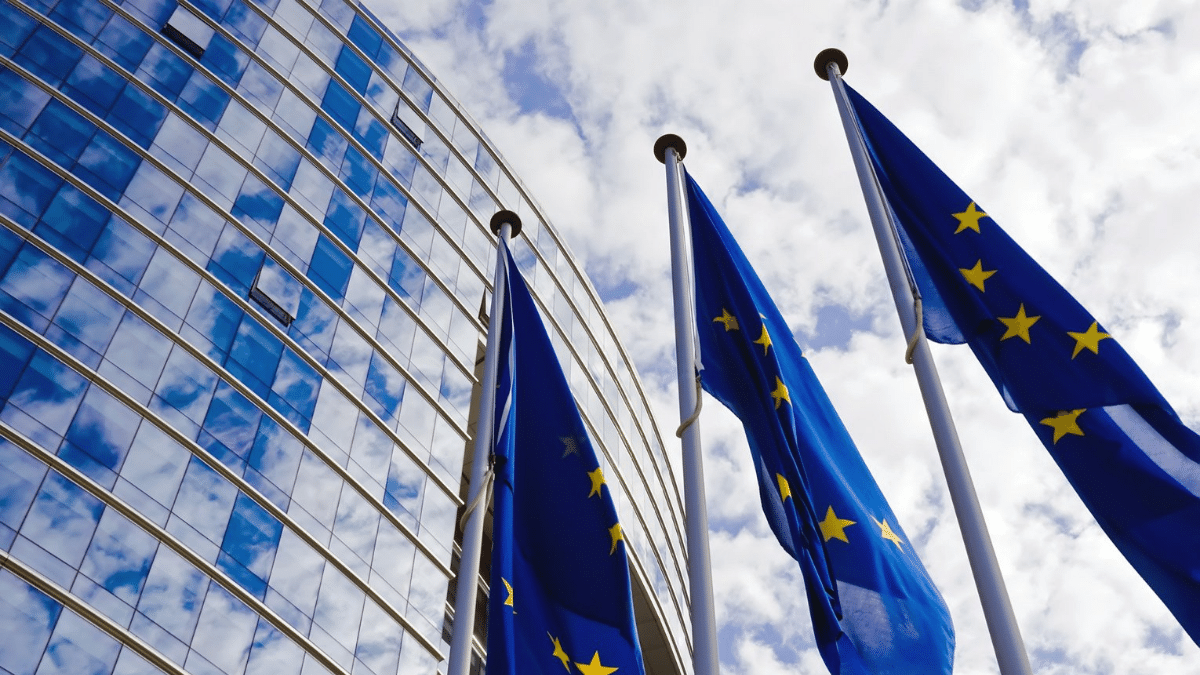
Over the past few years it has become increasingly clear that many government-led violations of LGBTI rights in EU Member States go hand-in-hand with an undermining of the rule of law and democracy. This includes in particular the degradation of the independence of judicial systems and the media landscape.
Particularly stark among this year’s submissions is the continual problem of non-implementation of European court judgments, especially around the right of LGBTI people to respect for their private and family life and the best interests of their children, as well as judgments related to legal gender recognition.
Efforts by authorities to restrict civic space; legal harassment, threats, hate speech and smear campaigns against LGBTI human rights defenders; and inadequate implementation of hate crime and anti-discrimination laws also remained prominent in 2023.
New draft law in Hungary seeks to exculde trans women from pension benefits
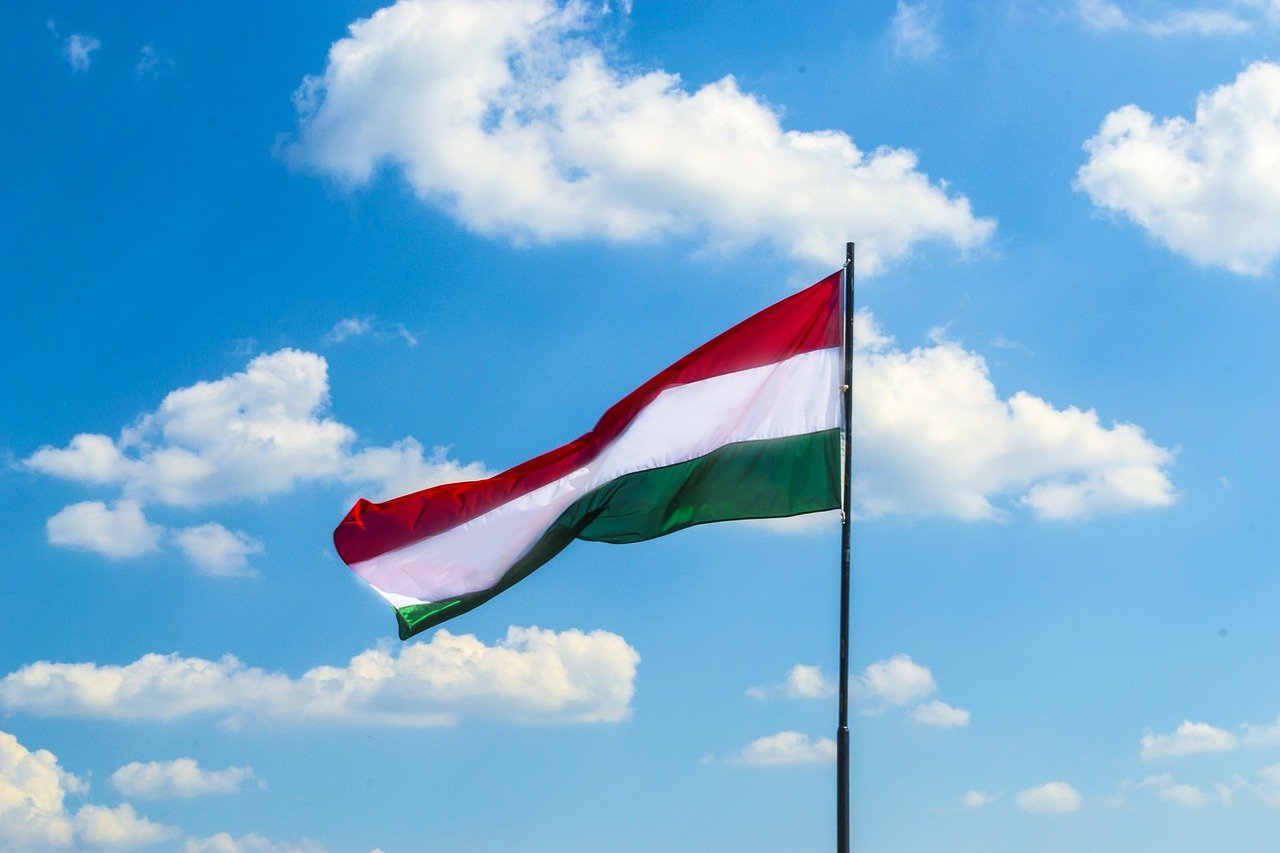
Alongside the Hungarian LGBT organisation Háttér Society, we have written to the President of the EU, Ursula von der Leyen, alerting her to the recent introduction of a new bill to further curtail the rights of transgender people in Hungary and of the intensification of the enforcement of the so-called “child protection law”. Read the letter below.
Dear President of the European Commission,
We are writing concerning the recent introduction of a new bill in the Hungarian Parliament to further curtail the rights of transgender people in Hungary and of the intensification of the enforcement of the so-called “child protection law”.
On July 13, 2023 two Members of Parliament from the FIDESZ and KDNP parties (both Ministers in the Cabinet of PM Orbán) submitted a new bill in Parliament[1] to exclude trans women from accessing pension benefits available only for women. The bill was a direct response to a court case in which the Veszprém Regional Court ruled that a transgender woman who had her gender legally recognized in 2013 is to be entered into the pension registration system as a woman and shall be entitled to the “Women 40” pension benefit.[2] The “Women 40” pension benefit was introduced in 2011, and allows women to retire after 40 years of employment even if they have not reached the general pension age. The court decision relied on a case of the Court of Justice of the European Union from 2006[3] which found that a transgender women – who in accordance with the conditions laid down by national law – have undergone male-to-female gender reassignment are entitled to retire under the same conditions as women whose gender identity corresponds to their sex at birth. The European Court of Human Rights arrived at the same conclusion.[4]
The new provisions proposed in the bill would apply to pending and repeat procedures as well. The explanatory memorandum of the bill is not only blatantly transphobic, but it distorts the text of the Fundamental Law to support the legislative agenda: it claims that the Fundamental Law mandates the registration of the sex at birth (or the so-called “biological sex”) only, whereas this rule is actually contained in the Act on Registry Procedures, not in the Fundamental law. It goes further, arguing that such solutions – i.e. that trans women enjoy the pension benefits reserved for women – would be unimaginable even in the most liberal countries.
The new legislation would apply only to a few trans women, since the Hungarian Parliament banned legal gender recognition for trans and intersex people in May 2020. A preliminary ruling was requested by a Hungarian judge on the compatibility of the resulting lack of legal gender recognition with GDPR, the court case is currently pending.[5]
The Hungarian Parliament is again reacting with brute force to a court decision that goes against their ideological narrative: instead of simply complying with it, the Parliament overrides the judgment of a court by passing amendments that will close the path for similar future decisions. This reactionary law-making defeats the principle of separation powers, and seriously violates the rule of law and the standards deriving from it. Furthermore, the new provision applies to trans women who had their gender legally recognized years, even decades ago in any future pension procedures, as well as in any pension procedures currently pending or being repeated due to court decisions. This is retroactive legislation which also violates the rule of law. The bill would not only go against international human rights standards, but is a clear violation of the case law of the Court of Justice of the European Union.
We ask the Commission to call the attention of the Hungarian Government to the uncontested case law of the Court of Justice of the European Union, and warn the Hungarian Government that the adoption of such a legislation would have serious consequences with regards to the Commission’s assessment of the Government’s commitment to improve the rule of law in Hungary. We also ask the Commission to closely monitor the Parliamentary debate of the legislation, and in case the legislation is adopted, initiate promptly an infringement procedure.
We would also like to call your attention to the intensification of the enforcement of the so-called “child protection law”[6] in recent months. Act no. LXXIX of 2021 amended several legislations with provisions to ban access of minors to content that “propagates or portrays divergence from self-identity corresponding to sex at birth, sex change or homosexuality”. Its implementing legislation[7] was also amended to require that “products intended for children that (…) propagate or portray divergence from self-identity corresponding to sex at birth, sex change or homosexuality shall be only sold separately from other products only in closed packaging.” The Commission launched an infringement procedure concerning the legislation; the case is currently pending before the Court of Justice of the European Union.[8]
In response to a freedom of information request, the Budapest Government County Office informed Háttér Society in February 2023 that there are 14 investigations pending regarding the enforcement of the above legislations.[9] Based on media information, Libri-Bookline Zrt. was fined for 1 million HUF (c. 2,700 EUR), and on July 13, 2023 LÍRA Kiskereskedelmi Kft. was fined for 12 million HUF (c. 32,000 EUR).[10] It is worth noting that Libri-Bookline Zrt. has recently been bought by Mathias Corvinus Collegium, a pro-government educational institution operating as a public interest asset management foundation receiving hundreds of billions of HUFs of public funding. Its president is Balázs Orbán, Political Director of PM Orbán. LÍRA Kft., which received a fine 12 times as high, is an independent chain of bookshops, whose leaders strongly criticized the adoption of the so-called “child protection law”. The imposition of such high fines runs the risk of bankrupting bookshops already under immense market pressure from a government-backed competitor. In the specific case concerning LÍRA Kft. the fine amounts to 56% of the company’s 2022 annual profit after taxation.
The intensified enforcement of the legislation is not limited to commercial activities, but is observable in the field of the media as well. Háttér Society is aware of at least 16 cases where the Media Council reached out to media authorities in other Member States concerning content that portrayed same-sex couples or transgender persons. Furthermore, upon request from the broadcaster M-RTL Zrt., the Media Council decided that a 30 second animated spot of the Budapest Pride Festival cannot be aired as social service advertisement as a substantial part of the spot features a lesbian couple, and thus depicts and propagates homosexuality. A regularly updated report about the enforcement of the so-called “child protection law” is available on the website of Háttér Society. Háttér Society is happy to provide access to English translation of the relevant decisions.
We ask the Commission to continue closely monitoring the enforcement of the legislation, apply for an interim measure at the Court to suspend the enforcement of the law, clarify with the Hungarian government that the not only the so-called “child protection” law, but also its implementing government decree violates the Charter horizontal enabling conditions, and increase the rate of funding withheld with reference to these legal developments.
We look forward to hearing from you. Sincerely,
Evelyne Paradis, Executive Director, ILGA-Europe
Hella Zsirka, Executive Board Member, Háttér Society
[1] Bill no. T/4659
[2] Case no. 101.K.701.331/2022/7.
[3] Sarah Margaret Richards v Secretary of State for Work and Pensions, Case no. C-423/04. The case is founded on the interpretation of Article 4(1) of Council Directive 79/7/EEC of 19 December 1978.
[4] Christine Goodwin v. the United Kingdom, Application no. 28957/95.
[5] Deldits-case, Case no. C-247/23
[6] Act no. LXXIX of 2021
[7] Government Decree 210/2009. (IX.29.) on the conditions governing commercial activities
[8] Case no. 769/22
[9] Letter no. BP/2200/01194-2/2023
[10] Decision no. BP/2200/03940-5/2023
The infringement against Hungary: Behind the scenes

As the deadline for member states to decide whether they will join the European Commission’s lawsuit against Hungary for its introduction of anti-LGBTI legislation fast approaches, we look at the vital work ILGA-Europe has been doing behind the scenes to bring this case before the EU Court of Justice and to bring countries on board.
In June 2021, the Hungarian Parliament adopted a law that prohibits or limits access to content that portrays the so-called ‘divergence from self-identity corresponding to sex at birth, sex change or homosexuality’ for individuals under 18. On 15 July 2021, the European Commission began infringement proceedings against Hungary for its potential breach with this legislation of several rights in the Charter of Fundamental Rights of the European Union and fundamental EU values. Then, on 2 December 2021, the Commission sent a reasoned opinion stating that Hungary had failed to fulfil its obligations under various EU directives. As Hungary’s response to the reasoned opinion was unsatisfactory, the Commission referred the case to the CJEU.
Next Tuesday is the deadline for Member States to give their support to the case at the CJEU, and while more member states are signing on, some key member states have not done so, and we continue our efforts to bring them on board.
It may seem that the nine member states who have given their support to the case are doing so simply because the human rights of LGBTI people are at stake, but the journey to bring an infringement procedure to the courts and for any member state makes in supporting a case against another member state is complex and fraught with obstacles. That’s why the long-term work behind the scenes of organisations like ILGA-Europe, which represents the LGBTI movement in Europe, has been key to gaining support for this infringement.
As with any litigation at the EU Court of Justice, the infringement against Hungary is rooted in protecting the EU treaties and legislative framework. The risk that violations of human rights can be dismissed, due to the fact that they do not fall within EU competences, is high. This is why from the very beginning, we equipped EU member states with the detailed arguments on how this piece of legislation violates EU law and thus allowed them to strongly come out against the law in the European Council in June 2021, right after the adoption of the law.
It is another long journey from a political statement to actually intervening at the Court. Member states, who are always reluctant to go up against each other at the EU Court, need to be furnished with a clear way forward within the EU framework. For us that meant finding the right people within the government administrations, connecting to them, and showing them the ways in which Viktor Orbȧn’s anti-LGBTI law actually contravenes the laws of the European Union, which Hungary signed up to when it became a member state. It also meant us providing information about how member states can intervene at the Court and what needs to be in place to do so.
Putting the Pressure On
When the Hungarian law was first published, alongside one of our member LGBTI organisations in Hungary, Hatter, we invested heavily in working with member states, providing them with accurate information about the law and our assessment of it. Using this, we were able to keep pressure on member states to encourage the European Commission to go forward with an infringement procedure in the first place.
The Hungarian law clearly violates the human rights of LGBTI people, such as freedom of expression and in education, but the tricky issue with EU infringement is that you need to prove exactly how a law introduced by a member state actually goes against EU legislation. For example, in the area of education the EU has very little competence. So, we knew that infringement couldn’t be based on the education element of the Hungarian law. Together with Hatter, we analysed the law at a deep level to find exactly how it went against EU legislation.
When, encouraged by a letter from 17 member states, the Commission launched its infringement against Hungary, we hosted a meeting, bringing together key players from different member states, knowing it was vitally important that they were in touch with each other, so that they could support each other in making the arguments within their administrations to support the case. Alongside our analysis, we provided technical advice about how to intervene, what the deadlines would be, and so on.
Until the moment a member state has officially declared that they’re supporting a case, it’s a very fragile process and therefore we don’t want to talk about it on a public level. We simply work hard behind the scenes to give member states everything they need to prove to their own legal administrations that they can realistically go forward, and the information on how they can do so.
The story goes back a long way
Really, this work began long before the Hungarian anti-LGBTI law was introduced. Alongside our member organisations, we have been actively educating member states so they can see they have a proactive role to play on EU level in general, and more specifically in front of the CJEU for a long time. Back in 2018, when the Coman case came before the CJEU, seeking the extension of free movement rights to same-sex couples in the EU, we worked with ACCEPT, our member LGBTI organisation in Romania, to help prepare the case. Our further role was to establish contacts with member states, to raise their awareness of the case and what it entailed, and to encourage them to intervene.
More recently we worked in the same way with Bulgarian member organisations in helping prepare the Baby Sara case, in which the CJEU ruled that a parent in one EU country is a parent in all EU countries, and in bringing member states on board to intervene.
This is slow-burning, long-term work. It’s about building the awareness of member states of the legal contraventions involved, but also their own mechanisms to be ready to act within the often very short deadlines of the court. We have seen the leading role that the Netherlands has been playing in supporting the Commission in the infringement case against Hungary, and in reaching out to other member states. This is building on the fact that the Netherlands, encouraged and educated by ILGA-Europe alongside our member organisations, intervened in both the Coman and Baby Sara cases.
What happens if the infringement is successful?
It doesn’t end there, and nor does our work simply end if the infringement against Hungary is successful. When it’s done, we will begin our work behind the scenes to actually get the judgement implemented, which won’t be easy or immediate. Romania has yet to implement the CJEU judgement in the Coman case, which was decided upon five years ago. Bulgaria recently said it would not implement last year’s CJEU judgement in the Baby Sara case.
However, if the infringement is successful and Hungary still refuses to drop its anti-LGBTI law, which it is likely to do, this doesn’t mean the success of the case will have no immediate impact. Winning these cases means that EU legislation will strengthen the work of national organisations, and if other EU governments come up with similar legislation, which is not unthinkable, other member states will have a mechanism and framework with which to act.
At ILGA-Europe, we deal in the certainties of the law. We examine what a procedure is about and what it is not about, and we take our work from there. We’re in it for the long term behind the scenes, working towards our goal of freedom, safety and equality for all LGBTI people in Europe and Central Asia. If we pretended that a case that is really about EU competencies is a case about something else, such as human rights compliance, we would find ourselves in murky waters. And member states do not like murky waters. They like certainty, as do the European Commission and courts.
Our submission to the EC 2023 Rule of Law report
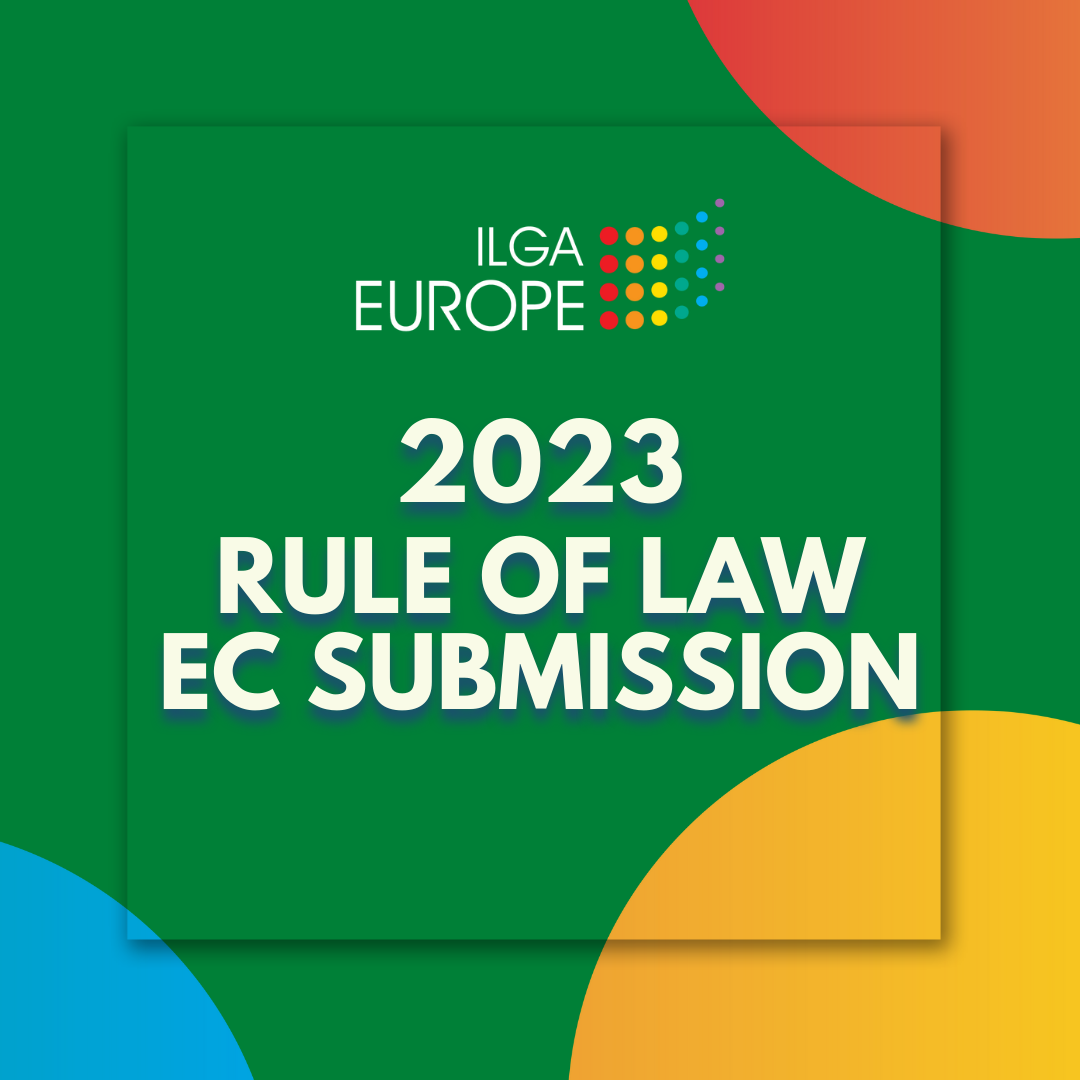
The submission covers developments in eight EU Member States as regards rule of law developments in the countries which have had an impact on the fundamental rights of LGBTI people and their democratic participation, with a focus on the past year (2022).
We have kept our inputs relevant to the content asked for by the consultation, and therefore we have not included all fundamental rights violations against LGBTI people, or all restrictions experienced by LGBTI civil society in the respective countries. We have only included them where there is a clear link to the issues of rule of law contained in the consultation.
Notably the submission covers the following topics:
- Manipulation of judicial processes to attempt to erode the human rights of LGBTI people and their access to justice;
- Politicians attempting to discredit and delegitimise the rulings of courts that uphold the rights of LGBTI people;
- Harassment and intimidation of LGBTI human rights defenders by law enforcement/prosecution services;
- Smear campaigns and negative narratives against LGBTI people, particularly where independence of media is threatened;
- SLAPPs against activists or journalists reporting on topics of public interest related to LGBTI;
- Censorship of LGBTI content;
- Tabling and adoption of laws aiming to reduce fundamental rights of LGBTI people;
- Tabling of laws aimed at restricting the functioning of civil society organistions;
- Arbitrary application of Covid-19 regulations to attempt to restrict the freedom of assembly of LGBTI people;
- Continued non-implementation of CJEU or ECtHR judgements which would improve the lives of LGBTI people;
- Anti-LGBTI discriminatory speech from political and religious leaders affecting public perception of LGBTI CSOs and creating an unsafe climate for LGBTI human rights defenders;
- Insufficient implementation of legal protection (e.g. protection against hate crime) for LGBTI people by responsible services, sometimes including Ombudspersons.
Hungary to be Brought Before Top EU Court For its Ban on LGBTI Content

The European Commission has referred Hungary to the CJEU over discriminatory amendments adopted in June 2021, which ban the “portrayal and the promotion of gender identity different from sex at birth, the change of sex and homosexuality” to under 18s.
Today, 15 July 2022, the European Commission formally referred Hungary to the Court of Justice of the European Union due to Hungary’s unsatisfactory response to concerns raised in the “reasoned opinion” sent by the Commission in December 2021.
This “reasoned opinion” was the second stage of the infringement process launched against Hungary in July 2021, in which the Commission outlined its concerns about the amendments breaching various aspects of EU law, asked for clarification over certain issues, and requested the amendments be brought in line with EU law.
In particular the Commission is concerned about discrimination against LGBTI people when it comes to various areas of EU competence, including the freedom to provide services, the free movement of goods, the Audiovisual Media Services Directive, the e-commerce Directive, freedom of expression and information, the right to respect of private life, and the right to non-discrimination.
ILGA-Europe’s member organisation, Hátter Society has reported that the amendments have already had a severe impact on LGBTI people in Hungary, as media service providers, bookshops, libraries, schools, and other actors covered by the law have begung to implement it voluntarily, in fear of sanctions. The discriminatory amendments and government campaigning around them has also resulted in a stark increase in hate crime against LGBTI people, and the amendments also leave LGBTI people and organisations at risk of arbitrary legal proceedings.
The Commission has found that Hungary’s response to their concerns in relation to equality and the protection of fundamental rights is unsatisfactory and does not include any commitment to remedy the incompatibility of the amendments with EU law, and have therefore decided to refer Hungary to the EU’s Court of Justice.
According to ILGA-Europe’s Executive Director, Evelyne Paradis: “It is encouraging to see the European Commission strongly defending EU law and the principle of non-discrimination when it comes to the treatment of LGBTI people. These amendments breach a variety of EU laws in a wide range of areas, and have already had a devastating impact on the rights of LGBTI people in Hungary. For too long the Hungarian government has been using LGBTI people as a political scapegoat; the rule of law must prevail in order to stop such an abuse of power. Now it is over to the Court of Justice of the European Union to live up to its legal responsibilities and defend EU law and the right of LGBTI people to live free from discrimination.”
To learn about the anti-LGBTI amendments in Hungary, and how the media, bookshops, libraries, schools etc. are implementing them, read this alarming report.
Read the Commission’s press release, which explains in more detail about which EU laws are breached here.
Complaint Filed with EC Against Lack of Free Movement for Same-sex Couples in Hungary

ILGA-Europe, alongside a Hungarian activist organisation, have filed a complaint against Hungary because of its refusal to implement the 2018 Coman judgement, which recognises that the term “spouse” includes same-sex spouses under EU freedom of movement laws.
Just ahead of the fourth anniversary of the ground-breaking 2018 Court of Justice of the European Union (CJEU) judgement giving freedom of movement to same-sex couples in the EU (Coman vs. The Romanian State), ILGA-Europe, alongside Hungarian LGBTI organisation, Háttér Society and supported by the law firm White and Case, have filed a complaint with the European Commission because of Hungary’s non-compliance with the judgement.
With a complaint already pending on Romania because it has not implemented the 2018 ruling, and is thus disrespecting EU law, proof has also been provided that Hungary also continues to ignore the judgement and is prohibiting freedom of movement for same-sex couples.
The Hungarian state body in charge of granting recognition to foreign marriages and foreign partnerships refuses to recognise same-sex marriages legally concluded in jurisdictions of other EU Member States, as obliged by the 2018 Coman ruling, thus impeding freedom of movement within the EU and breaching EU law.
The refusal of the Hungarian State to comply with the Coman judgment is illustrated in a recent opinion issued by the Hungarian Ministry of Justice, which, in essence, states that the validity of a foreign marriage should be assessed under the country’s International Private Law Act (IPLA). Under the IPLA, a foreign marriage shall only be valid if the legislative conditions in the countries of both spouses country laws are satisfied, in other words the laws of the States of which the spouse is a national. According to sec. 12(1) of the IPLA, however, foreign law is not applied if the result of its application would violate fundamental values and constitutional principles.
Following the standpoint adopted by the Ministry of Justice, the Hungarian authorities deprive the following same-sex couples of marriage recognition (and thus freedom of movement):
- A same-sex marriage legally concluded abroad (including in other EU jurisdictions) with a Hungarian national. The Hungarian authorities do not allow for a recognition of a same-sex marriage with Hungarian nationals since Hungarian law does not provide for same-sex marriage.
- A same-sex marriage legally concluded abroad (including in other EU jurisdictions) where both of the spouses personal laws allow for same-sex marriage. The Hungarian authorities do not allow for recognition of same-sex marriage, because they consider it contrary to Hungarian public policy, and in alleged violation of the fundamental values and constitutional principles of the Hungarian legal system.
Active Steps To Make Life for Same-sex Couples More Difficult
In addition, requests for recognition of foreign same-sex marriages have not merely been denied, the Hungarian State has also taken active steps to make the lives of same-sex couples even more difficult than they were at the time the Coman ruling was delivered.
Since 2019, third-country nationals (non-Hungarian, non-EU) cohabiting with a Hungarian citizen, whether formally registered with public notaries as cohabiting partners or not, are no longer considered as their “family member,” thereby denying them basic immigration rights. This additional hurdle has worsened the conditions of same-sex couples in Hungary. Whereas the recognition of same-sex marriages has always been denied, third-country nationals living with a Hungarian citizen outside of a registered partnership will now also be denied the right to reside permanently in Hungary.
This situation is in clear violation of EU law and the 2018 Coman ruling of, as well as Art. 21(1) and Art 4(3) of the Treaty on the Functioning of the European Union (TFEU) and the Directive 2004/38/EC on the right of citizens of the Union and their family members to move and stay in the territory of the Member States.
The landmark Coman ruling was adopted four years ago, recognising that the term “spouse” includes same-sex spouses under EU freedom of movement laws. The ruling was supposed to provide same-sex spouses with much-awaited freedom of movement and long-overdue equal treatment throughout the EU. However, on its fourth anniversary, not only has Mr Hamilton, the spouse of Mr Coman, still not been granted residency in Romania, but legislation in both Hungary and Romania continues to violate the right to freedom of movement for same-sex couples.
The CJEU explicitly held that the refusal to recognise the same-sex marriage of an EU citizen, which constitutes a restriction of their right to move and reside freely within the EU under Art. 21(1) TFEU (Coman, § 40), cannot be justified on public policy and national identity grounds (Coman, §§ 41-50). Numerous administrative procedures have been pursued in Hungary, notably by Háttér Society. Háttér assist same–sex couples to apply for domestic registration of their same–sex marriage concluded outside Hungary, either as marriage or as a registered partnership, in order to obtain a right of residence. Such applications have, to date, always been rejected.
According to Katrin Hugendubel, Advocacy Director with ILGA-Europe, “We urge the Commission to investigate the complaints filed regarding Hungary and Romania, and to take all steps at its disposal, to ensure that Hungary, Romania, and indeed all Member States, respect the Coman ruling at the Court of Justice of the European Union. In essence, the ruling states that all EU member states are obliged to recognise legally concluded same-sex marriages in other member states, whenever this is necessary to secure the freedom of movement of the same-sex spouse.”
Anti-LGBT Hungarian Referendum is in Bad Faith, says ILGA-Europe
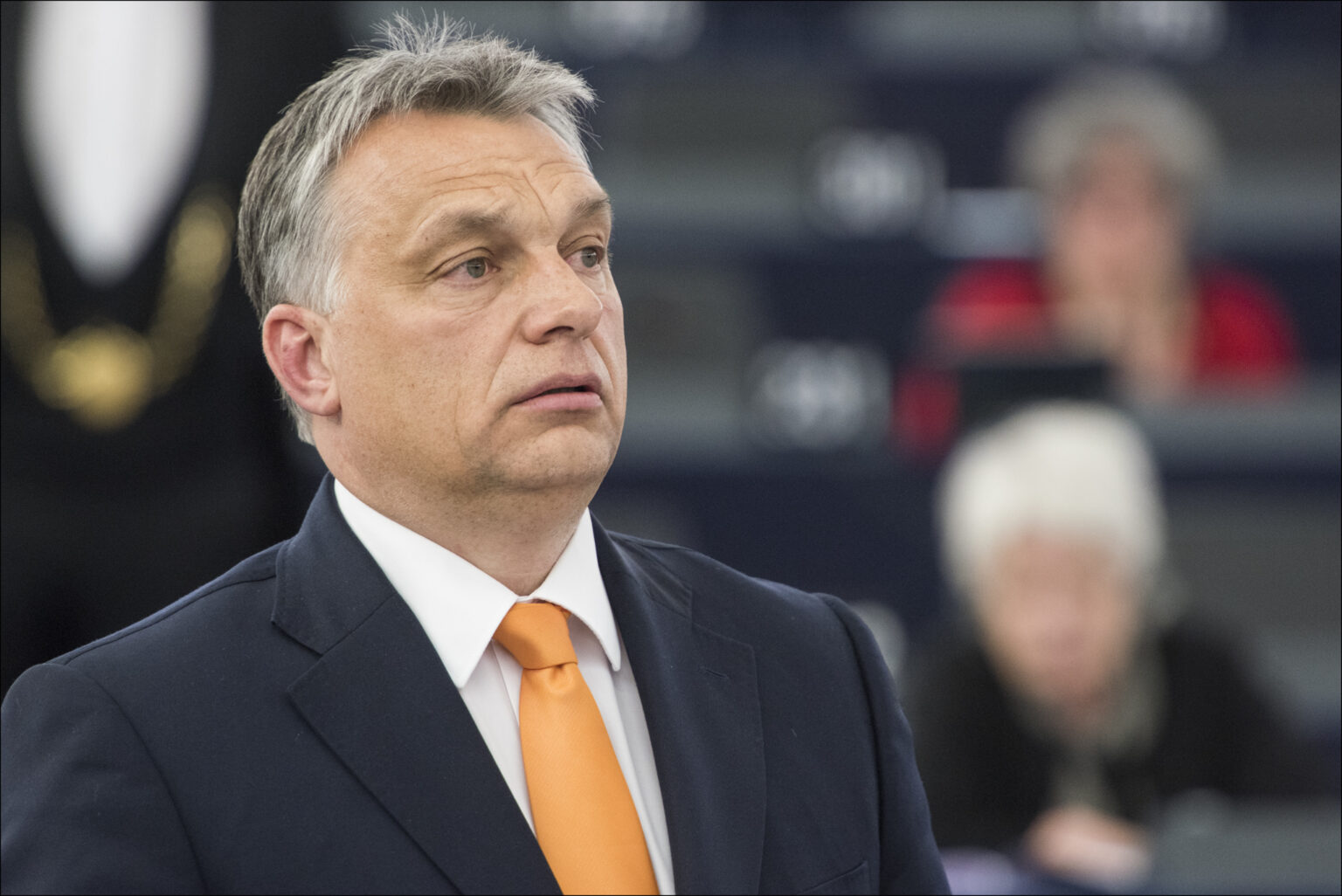
A referendum to be held this coming Sunday during the Hungarian general elections carefully designed to force voters into siding with the current ruling party, Fidesz, against the LGBTI community.
On April 3, the same day as the Hungarian general elections, the ruling Fidesz party will hold a referendum asking the public to validate anti-LGBT legislation that was introduced last year.
The law, banning the “portrayal and the promotion of gender identity different from sex at birth, the change of sex and homosexuality”, was decried by a majority of member states of the European Union, and led the European Commission to take infringement procedures against Hungary.
The referendum, which will be held on the same day as the Hungarian general election will ask four questions:
- Do you support the teaching of sexual orientation to minors in public education institutions without parental consent?
- Do you support the promotion of sex reassignment therapy for underage children?
- Do you support the unrestricted exposure of underage children to sexually explicit media content that may affect their development?
- Do you support the showing of sex-change media content to minors?
However, it is clear from polls and actions of the Hungarian people that state-sponsored anti-LGBTI rhetoric and legislation is not matched by public opinion. Support for LGBTI people in Hungary has never been as high. A record 35,000 people marched at Budapest Pride last July, including many MEPs and other European officials.
According to a representative poll commissioned by Amnesty International Hungary and Háttér Society and conducted by polling agency Medián between 13 and 19 July 2021, 73% of Hungarians reject the government’s false claim that gay and lesbian people abuse or harm children. A clear majority of Hungarian society (74,5%) believe that transgender people should be able to change their gender and name in their official document, while 59% support same-sex marriage.
According to ILGA-Europe’s Advocacy Director, Katrin Hugendubel: “The referendum is in bad faith and specifically timed as part of Prime Minister Viktor Orbán’s continued effort to scapegoat LGBTI people as a method of holding onto power, by distracting from the gross failings and corruption of his government. The questions it poses are carefully designed to force voters into siding with Fidesz against the LGBTI community, thereby giving the false message that the values of the Hungarian people are contrary to the values of the European Union.”
Due to the fact that the referendum coincides with the elections, LGBTI activist organisations in Hungary are not calling for a boycott. Rather they are asking for people to invalidate their referendum vote, since the questions it poses are not in good faith
European Commission and Council should refrain from approving recovery funds to the governments of Poland and Hungary

An Urgent call on the European Commission and the Council of europe to refrain from approving recovery funds to the governments of Poland and Hungary, and to provide direct support to local authorities, civil society and human rights defenders providing for refugees of the war.
We are deeply concerned that the European Commission and the Council consider unblocking the EU Recovery and Resilience Facility funds to the governments of Poland and Hungary, and that the Commission talks about further delaying the activation of the rule of law conditionality regulation in their regard, due to the current political and humanitarian crisis following Russia’s military invasion of Ukraine on 24 February.
Revising the critical decision to suspend approval of the EU recovery funding for Poland and Hungary now, would send the wrong political signal to the governments of Poland and Hungary who have made no progress in course-correction of laws, policies and practices undermining checks and balances and the overall rule of law architecture. Such a decision also risks setting a dangerous precedent and undermines the EU rule of law conditionality mechanism, designed to protect the EU budget in the long run.
As organisations working across Europe to defend fundamental rights and the rule of law, we call on the European Commission and the Council to refrain from approving recovery funds to the governments of Poland and Hungary in haste without genuine and solid guarantees that the rule of law concerns, notably regarding the lack of independence of the judiciary and anti-corruption democratic safeguards, will be resolved.
The war in Ukraine should not be used as a pretext to weaken the rule of law mechanism and let any Member State get away with serious rule of law violations. If anything, this war shows the very real dangers that come with a country dismantling the rule of law and democratic oversight. This is not the time to set aside concerns about the rule of law and respect of fundamental rights in EU Member States. Unblocking funds whereas the concerns in the countries remain as serious as ever, would be detrimental.
The EU has a legal obligation to mitigate the risks of EU funding being misused, and hold firm on the need for further negotiations before releasing the recovery funds, while at the same time triggering without further delay, the conditionality mechanism. Article 7.1 TEU procedures must continue as Article 2 TEU continues to be undermined.
Neither Poland, nor Hungary, have made meaningful progress to restore the checks and balances necessary to uphold the rule of law and reinstate an independent judiciary. If the EU allows the Polish government to ignore the CJEU ruling concerning the Disciplinary Chamber of the Supreme Court, the risk that independent civil society in Poland, which has been the main respondent to the Ukrainian refugee crisis, will be further criminalised and forced to halt their activities is very real.
Contrary to demonstrating positive reforms the Polish Parliament tried to amend a law to ensure impunity for authorities during the Ukraine crisis. In addition, a legislative proposal, attempting to ensure that government officials could not be held accountable for their disposition of emergency funds, was narrowly defeated, by only one vote in the Polish Parliament.
Directly support local authorities, civil society and human rights defenders providing for refugees of the war
The war in Ukraine has already forced over three million people to leave Ukraine to seek safety. The support of millions of people poses a major challenge involving the provision of shelter, food, clothing, childcare, health care, psychological support, legal aid, and other essential services.
Civil society, local authorities, citizens and human rights defenders have responded rapidly, providing the vast majority of services to those fleeing. By contrast assistance from central government in Hungary and Poland has been limited. As further arrivals are anticipated and longer term support is required, direct financial assistance to civil society is urgent, to avoid a fast-developing humanitarian disaster.
The government in Poland is not just falling short on its humanitarian duty and the local relief effort. It is under suspicion of gross mismanagement of both EU and Polish funds designated to support vulnerable groups.
There is undoubtedly a serious risk that making emergency means available to the government will affect the management of EU funds contrary to their purpose and in violation of generally accepted standards of responsible management. There is also a serious risk that if allowed to pass through the government, such emergency means may be abused for political ends, and inefficiently spent for its purpose, 41 Polish civil society organisations warn. We share their concerns.
This is not the moment to set aside rule of law conditionalities. In Hungary, the government’s continued failure to execute the CJEU’s judgment establishing that the so-called ‘Stop Soros law’, criminalising support to asylum seekers and refugees, violates EU law and should be repealed.
The law exposes civil society organisations and human rights defenders on the frontline providing assistance to refugees fleeing Ukraine to serious risks, including prison sentences. The EU cannot allow the Polish government to continue to reject the rulings of the CJEU concerning the Disciplinary Chamber and risk further attacks. Scrutiny is required.
We call on you as Presidents of the European Commission and the Council to hold strong on the fight for freedom, democracy and respect for fundamental rights and rule of law that Russia’s invasion in Urkaine has put back at the centre of our lives. Emergency support can be made available through other ways and our organisations are ready to meet and discuss how we can support the European Commission in ensuring that emergency funds reach those who urgently require assistance.
Our submission to the EC 2022 Rule of Law Report
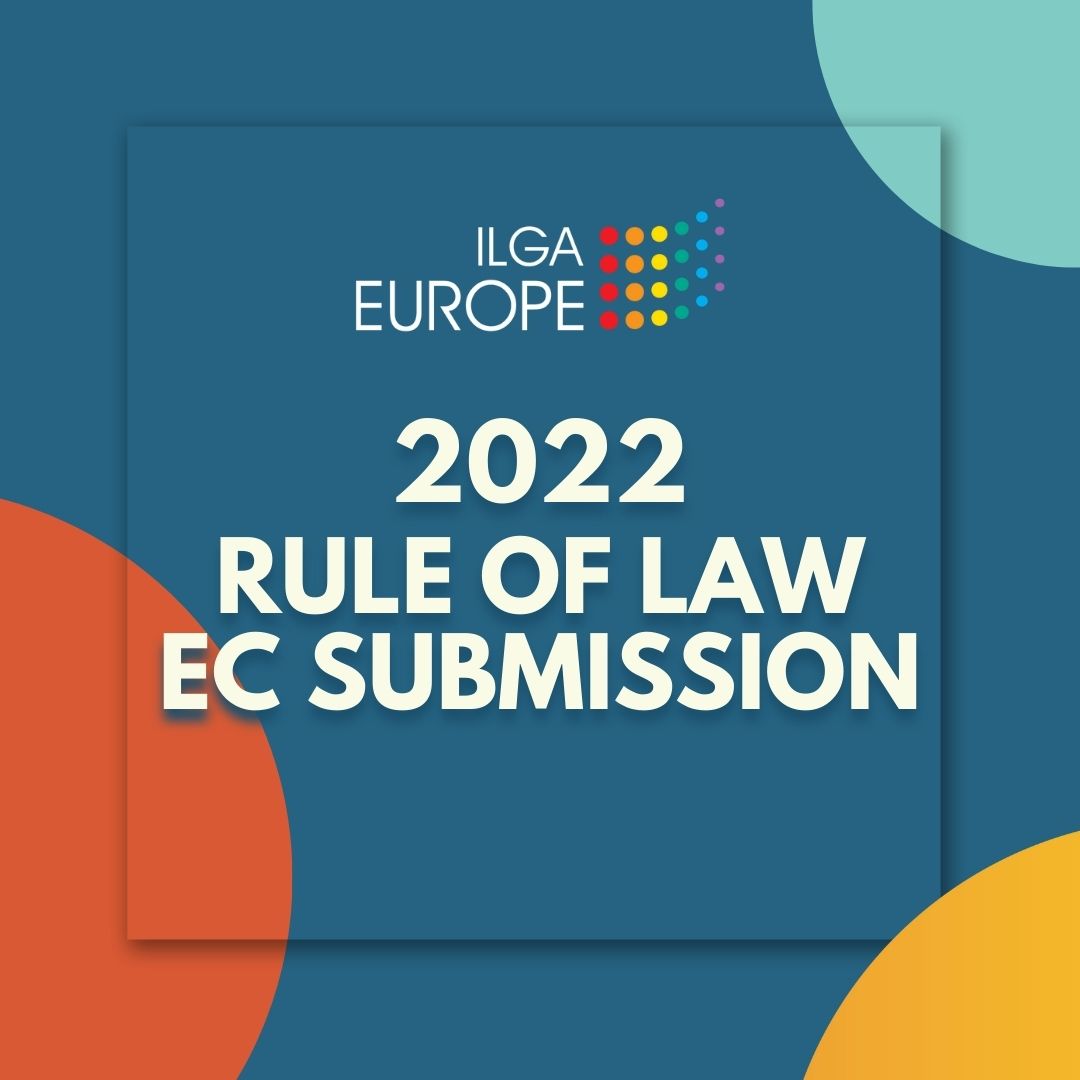
Expert contributions were provided by organisations PROUD (Czech Republic), LGBT komiteen (Denmark), Inter-LGBT (France), Háttér Társaság (Hungary), KPH & Atlas of Hate (Poland), ACCEPT (Romania), and Legebrita (Slovenia).
The developments encompassed in the submission point to systematic attacks on the fundamental rights of LGBTI people enabled by the weakening of rule of law and democratic structures. We have not included all fundamental rights violations against LGBTI people, or all restrictions experienced by LGBTI civil society in the respective countries, only those which are relevant to the respective headings of the consultation, where there is a clear link to rule of law.
Notably the submission covers the following topics:
- Political interference or bias in court cases related to LGBTI rights, in particular where independence of the judiciary is under attack;
- Anti-LGBTI bias, smear campaigns and censorship of LGBTI content, in particular where media freedom is under attack;
- Funding restrictions or discriminatory distribution of public or EU funds, affecting LGBTI organisations;
- Arbitrary application of Covid-19 regulations to attempt to restrict the freedom of assembly of LGBTI people;
- Covid-19 emergency measures affecting the process of preparing and enacting laws (exclusion of LGBTI CSOs in consultation phases or even fast-track adoption of legislation directly attacking LGBTI people);
- Non-implementation of CJEU or ECtHR judgements which would improve the lives of LGBTI people;
- Judicial harassment of LGBTI activists (in particular SLAPPs);
- Insufficient follow-up of anti-LGBTI hate crime cases;
- Anti-LGBTI discriminatory speech from political and religious leaders affecting public perception of LGBTI CSOs and creating an unsafe climate for LGBTI human rights defenders (in some cases leading to attacks on CSO offices, employees and volunteers).
What has 2021 meant to the LGBTI movement in Europe? Listen to our latest podcast episode to find out this year’s highlights
As 2021 comes to an end, we have collected some of the moments, events and trends that have marked the year in the latest episode of The Frontline, ILGA-Europe’s podcast about LGBTI activism and lives in Europe and Central Asia. Read here some of the episode’s highlights and find out reasons to stay hopeful in 2022.
2021 has been a year of further lockdowns, of new strains of the COVID virus, and the uncertainty they have brought, and most of all, enormous reverberations of the unprecedented events of 2020 on people’s lives. For the LGBTI movement and communities in Europe, 2021 has also been the year of the growth of a perceived east-west divide in Europe over LGBTI rights, infringement procedures taken by the European Commission against Hungary and Poland because of their anti-LGBTI laws and programs, a sharp rise in the demonisation and isolation of trans people from the women’s movement, and an overall rise in authoritarian regimes seeking to instrumentalise LGBTI lives to limit the rights of others. So, it’s perhaps strange that our guest in this episode, ILGA-Europe’s Executive Director Evelyne Paradis finds great hope for the LGBTI movement amid the storm.
How has COVID-19 continued to affect our communities?
For LGBTI communities, visibility is of top importance. In 2021 we’ve continued to reinvent ourselves while facing new challenges such as building alliances in the digital space with people you don’t know.
The most marginalized ones in our communities have found themselves particularly isolated. On the flip side, many LGBTI activists and organisations across the region have been very resourceful and creative to meet the needs, which comes with a cost because it’s a lot of work.
“I hope there’s going to be of lightness in 2022 for activists,” says Evelyne Paradis.
Is there a divide between the east and the west of Europe?
This year we’ve seen in media and elsewhere a growth of a perceived east-west divide, also when it comes to LGBTI issues. “It is not a real divide, but it is a divide,” she says. “There is a politically driven effort to create multiple divides”.
History shows that creating an ‘other,’ creating an enemy, can help other purposes. In 2022 the work will continue to be to stay attentive in order to not fuel that perceived divide.
Infringement procedures against Poland and Hungary
“We’re in a moment of hope with the EU,” says Evelyne Paradis. “The EU is taking a lot more concrete and bold actions based on their values.” In July, the European Commission announced infringement procedures against Hungary, concerning the censorship of a children’s book portraying LGBTI characters and the prohibition of the inclusion of LGBTI people in material in schools or in media for under-18s, and Poland, concerning a refusal to clarify whether LGBTI people are discriminated against in the labour market in the country’s so-called LGBT Free Zones
A year ago, to think about infringements seemed ambitious. Starting infringement procedures was important for LGBTI communities in these countries too, and the people supporting them — in that sense there’s no divide. Although we have to be careful not to create an “us vs. them” divide, Evelyne Paradis explains, we’re also in a moment when we have to assert and act in accordance to the values that hold us together.
However, Poland and Hungary are not anomalies. They are only the tip of the iceberg as scapegoating LGBTI minorities is spreading to other places. We are at a moment when human rights cannot be taken for granted.
“Times are hard for LGBTI people in the region, not just in Poland and Hungary,” she says. ILGA-Europe has reported a lot of LGBTIphobic violence this year. Now it’s the time for politicians to do the right thing.
Where do we find hope?
“I find hope in the reaction that the publication of our Rainbow Map prompted,” says Evelyne Paradis.
The message “it’s time to reboot” was heard by governments. Politically it feels that the situation is so bad that there’s no option but to act. Many politicians and representatives have contacted ILGA-Europe along 2021, and “it’s our job to tap into that opportunity.”
ILGA-Europe statement on gender
On March 8 ILGA-Europe published a statement on gender, to reaffirm our commitment to standing up against any discourse aimed at negating the rights of some people.
The decision came from observing how harsh the situation for trans people and communities was becoming, but also “from the deep sadness at observing how the beauty of human rights language, the beauty of feminism was been used and abused to divide groups and communities,” says Evelyne Paradis.
It was also a way of saying to trans individuals that we’re here, that a vision of gender that brings us all together is at the core of ILGA-Europe’s work.
Fighting for democratic rights
For a while now, the fight has moved again to be one of fight for democratic rights and freedoms, because in some parts of the region the authoritarian tendencies are very strong again. The freedom to be in the public space with no fear of arbitrary arrests cannot be taken for granted by LGBTI people and communities, as we’ve seen in the METU Pride trials in Turkey.
The clampdown of core democratic spaces is very real and that shapes the work ILGA-Europe does, which is making sure that groups can come together in the face of repeated attacks.
Activists groups need to reconvene, “they need the comfort of coming together.” In this sense, the COVID-19 pandemic is not helping. Spaces like ILGA-Europe’s Annual Conference, that this year was moved for the second time to the digital sphere as an alternative to an in-person meeting, are spaces of restoration.
Strategic litigation as a way forward for LGBTI rights
It’s been a reason for hope to see national and European courts moving in the right direction for some years now, Evelyne explains. Some successful examples in 2021 have been METU Pride trial and Baby Sara case.
However, not because there’s a judgement it means there’s going to be a change anytime soon. There are two caveats to consider. First, it is quite telling of the current context that LGBTI people have to go to court. Second, court judgments, as positive as they can be, rely on governments to implement them. Three years after the landmark judgment issued by the CJEU against Romania, recognising that the term spouse includes same-sex spouses under EU freedom of movement laws, Romania has not implemented the Coman case yet.
“We’ve had to do a lot more work,” she says. “It’s good to see that we can use the courts more but it also doesn’t end there.”
ILGA-Europe’s Gathering Online
It was great to see that people coming together at the Gathering Online despite the screen fatigue. As in 2020, we hosted an online version of Europe and Central Asia’s LGBTI largest conference in October. The main topics discussed along the week were racism, poverty and other forms of structural inequalities that affect the movement, the political context in which we operate, and the creative responses to it.
The main message, says Evelyne Paradis, was to go back to the essence, to the belief in the importance of creating a world that is fair and just, which is the reason why all of us keep standing up for human rights and the LGBTI movement.
It is also a week when solidarity was embodied. “This is where probably I get the most hope, that we are collectively getting into that space of really seeing each other as human beings.”
Some hopes for 2022
“My hope is that as a movement we grow in sincere solidarity, that institutions and governments in Europe continue to find the courage to do the right thing and act.”
Evelyne Paradis also hopes that more and more allies and coalitions become stronger and stronger, “that we turn the tides around.”
“It’s our priority to make sure that LGBTI organisations can do their work,” she concluded.
Presented by ILGA-Europe, The Frontline is a podcast about LGBTI activism and lives in Europe and Central Asia. Deep-diving and analysing from a unique and informed perspective, The Frontline aims to bring you to the core of queer activism and give you an understanding on the complexities of what’s happening, why it’s happening, the wins and the losses, the challenges and commonalities, and the extraordinary ways in which the work of those on the frontlines continues in a rapidly changing world.
EU Holds Firm in Face of Hungary’s Blatant Lies Surrounding Anti-LGBTI Law

As the European Commission takes the second step in its infringement procedure against Hungary, Europe’s leading LGBTI organisation welcomes its clarified commitment to the equal human rights of the people of Hungary and all other EU member states.
Today, 2 December 2021, the European Commission (EC) began the second phase of its infringement procedure against EU member state, Hungary, due to discriminatory amendments adopted on 23 June in the country, which ban the “portrayal and the promotion of gender identity different from sex at birth, the change of sex and homosexuality”.
On 15 July 2021, the European Commission formally notified Hungary of the beginning of infringement proceedings regarding the amendments. The Hungarian Prime Minister, Viktor Orbán responded by accusing the Commission of “legalised hooliganism” and announcing plans to call a referendum on the amendments, falsely insisting that the infringement procedures specifically seek to interfere in the Hungarian education system. Since then a number of Hungarian government officials have similarly sought to mislead the Hungarian and European public in regard to the content of the infringement procedures.
Today the Commission said that it finds Hungary’s official response to its notification insufficient, and it has therefore started the second phase of the infringement process by sending Hungary a letter known as a “reasoned opinion”, outlining the parts of the new Hungarian law that are breaching EU law, and demanding that these are changed. The EC also identified that even more EU laws are being breached by the amendment, and contrary to claims from the Hungarian government, it did not mention any educational directives in its reasoned opinion.
Instead it clarified that it is specifically concerned with breaches to fundamental EU law when it comes to the freedom to provide services and the free movement of goods. Hungary, the Commission says, has not shown how restrictions in its legislative amendments are duly justified, non-discriminatory, and proportionate.
In addition, the EU clarified breaches of the Audiovisual Media Services Directive and the e-commerce Directive, citing restrictions in the amendments regarding audiovisual media content, including discrimination based on sexual orientation.
The Commission also deems that the Hungarian amendments violate human dignity, freedom of expression and information, the right to respect of private life as well as the right to non-discrimination as enshrined in Articles 1, 7, 11 and 21 of the EU Charter of Fundamental Rights, and due to all of this, the amendments violate Article 2 of the Treaties of the European Union.
According to Katrin Hugendubel, Advocacy Director with Europe’s leading LGBTI organisation, ILGA-Europe: “The Hungarian government keeps twisting the facts and stating that it is protecting children and acting on the will of its people with these amendments. Both statements are patently false. The amendments are an attack on children’s rights as well as the rights of LGBTI people. Contrary to the amendments reflecting the will of the people, support for LGBTI equality is growing in Hungary.
“With these amendments and his referendum, Orbán is running a campaign in advance of elections next year, hoping to distract from the massive problems his government is responsible for by scapegoating the LGBTI community. The EC is right to hold the Hungarian government accountable to the Treaties, and should not hesitate to see this through, including by bringing Hungary in front of the Court of Justice of the European Union (CJEU).”
Hungary now has two months to remedy the breaches identified by the Commission. If they do not amend the law to remove the breaching anti-LGBTI provisions, then the Commission will refer the case to the CJEU.
For further comment, contact: Ana Muñoz Padrós, ILGA-Europe: ana@ilga-europe.org, +32 493 35 60 55
The frontline: Queer and the Media: with Ben Hunte
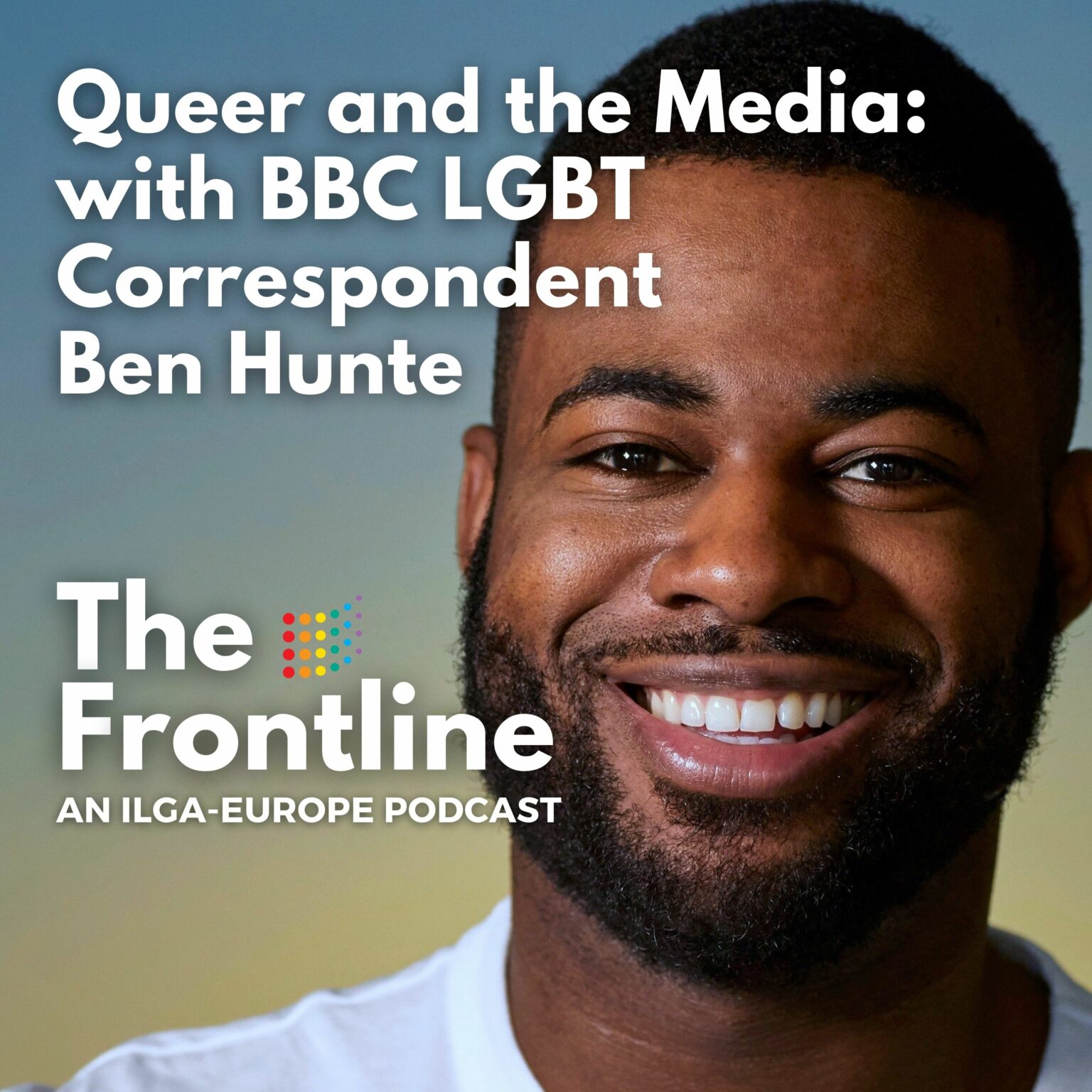
Ben Hunt’s first year on the job as BBC LGBT Correspondent* has been an unprecedented one, with the rise of anti-LGBT hatred in Europe, marked by stark developments in Poland and Hungary.
In this episode of The Frontline, Ben sits down with us to talk about the relationship between the media and LGBTI issues, why some stories get all the attention to the detriment of others, the rise of anti-trans voices in newspapers and broadcasting, and ways we might get the real diversity of LGBTI stories picked up.
Listen below or click here to listen and subscribe to The Frontline on your favourite podcast platform.
* Since the publication of this podcast, Ben Hunte has resigned from the BBC to join Vice News
With today’s infringements the EU has clarified that member states can no longer act against human rights with impunity
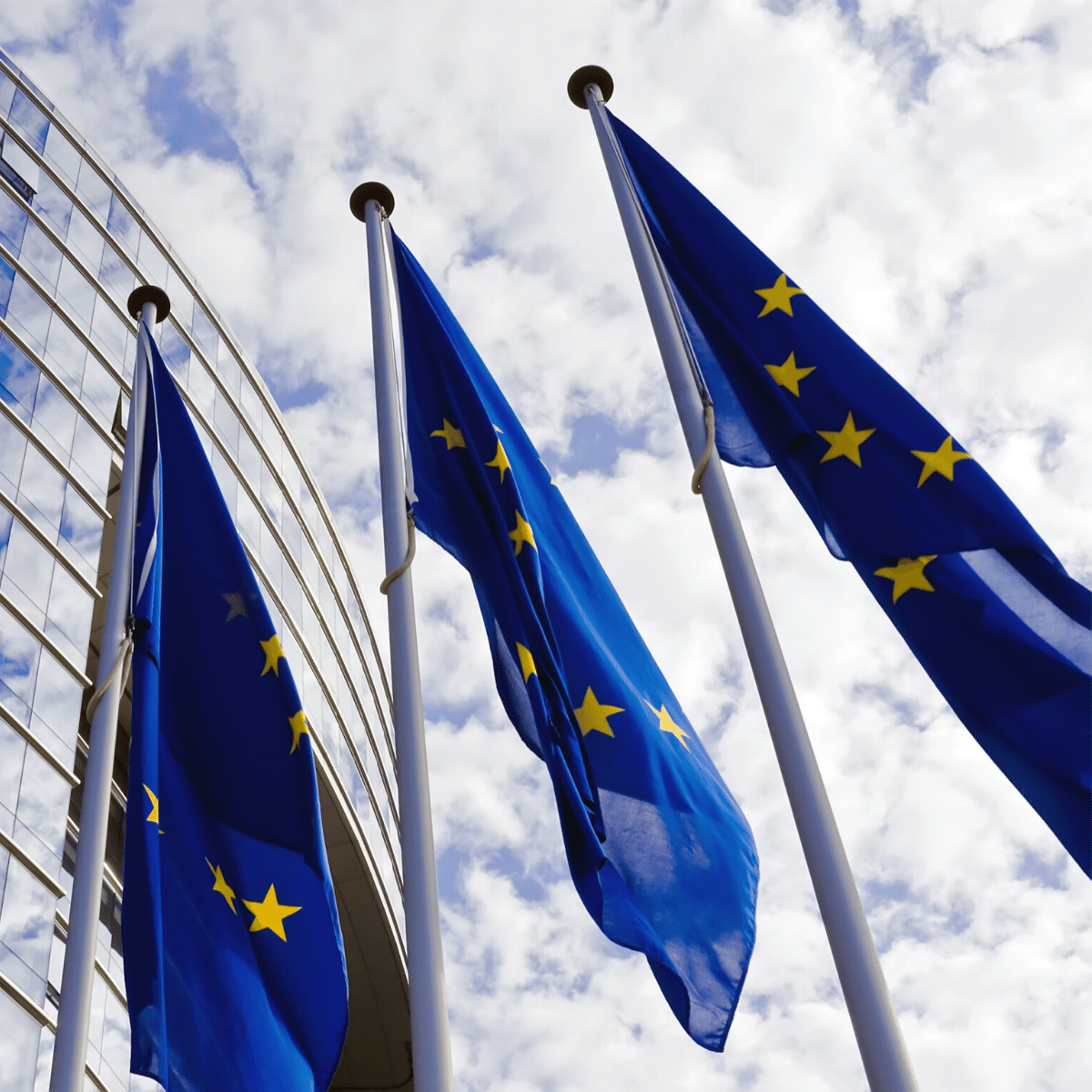
According to ILGA-Europe, the infringement procedures announced by the European Commission today show that the EU has come to a tipping point; after years of governments testing how far they can go, the European Commission has taken a clear step to hold Hungary and Poland accountable on the rule of law and fundamental rights.
Today, July 15, the European Commission announced that it will take landmark infringement procedures against both Hungary and Poland. The procedures against Hungary concern the censorship of a children’s book portraying LGBTI characters, and the legislation that entered into force last week, which prohibits the inclusion of LGBTI people in material in schools or in media for under-18s. The procedures against Poland concern a refusal to clarify whether LGBTI people are discriminated against in the labour market in the country’s so-called LGBT Free Zones .
According to ILGA-Europe, the leading LGBTI rights organisation in Europe, the infringements are a clear message to all member states that they are bound by their membership to respect the core principles of the European Union.
The first infringement against Hungary is in respect of a book of reimagined fairytales with diverse characters entitled, Wonderland is for Everyone, which was published in September 2020. The book became an immediate target of homophobic attacks by politicians in the ruling Fidesz party, including the Hungarian Prime Minister Viktor Orbán, calling it “homosexual propaganda”. In January, the Hungarian government ordered the publisher of Wonderland is for Everyone to print disclaimers identifying books containing “behaviour inconsistent with traditional gender roles”, thus restricting the right to freedom of expression and the right to non-discrimination as enshrined in Articles 11 and 21 of the EU Charter of Fundamental Rights and breaches the Unfair Commercial Practices Directive.
The second Hungarian infringement is in relation to legislative amendments voted in on June 15, banning the “portrayal and the promotion of gender identity different from sex at birth, the change of sex and homosexuality” for persons under 18 and for public servcie advertisement even without any age limit. The language surrounding this ban has been introduced into the following Hungarian legislation: the Child Protection Act, the Family Protection Act, the Act on Business Advertising Activity, the Media Act, and the Public Education Act, clearly breaching a number of EU laws and violate international human rights norms, in particular restricting cross-border information society services, and the Treaty principles of the freedom to provide services (Article 56 TFEU) and the free movement of goods (Article 34 TFEU), by failing to demonstrate that the restrictions are necessary, non-discriminatory, and proportionate and pursue a legitimate interest.
On the day the Hungarian legislation came into force, the European Parliament voted in favour of urgent legal action against its member state, saying that the law was “another intentional and premeditated example of the gradual dismantling of fundamental rights” in the country.
The infringement against Poland has been launched because of the non-cooperation of Polish authorities in clarifying the question in how far the so-called Family Charters and LGBT Free Zones, which over 100 Polish local governments have adopted since 2019, might lead to discriminationon the grounds of sexual orientation and the Charter of Fundamental Rights, specifically ensuring non-discrimination in access to and in the labour market in line with EU anti-discrimination law, and also regarding management of the Structural and Investment Funds.
According to ILGA-Europe’s Advocacy Director, Katrin Hugendubel: “By opening infringement procedures, the EC clearly states that the Polish and Hungarian governments are violating fundamental rights and, as they are unwilling to engage in sincere cooperation, and is now stepping up and opening a clear procedure to ensure the full respect of the Treaties and EU legislation. This could ultimately result in the EC bringing both countries in front of the Court of Justice of the European Union (CJEU).”
Over the past two years, ILGA-Europe has been advocating at the highest EU levels for sanctions against Poland and Hungary, as the governments of both countries have increasingly stoked anti-LGBTI hatred, thereby sewing political and societal division. ILGA-Europe stated concerns that this instrumentalisation of a vulnerable minority, which was first employed by Vladimir Putin in 2013 with the Russian anti-propaganda law, was providing an example to the governments of other EU member states leaning in this direction, who saw Poland and Hungary acting with impunity in violation of EU directives and core values.
Executive Director of ILGA-Europe, Evelyne Paradis said: “For years now, we have been observing some EU member states consistently testing EU democracy and the protection of the rule of law and fundamental rights. The infringement procedures announced today send a clear signal that enough is enough. EU member states can no longer act against human rights with impunity, nor can governments go on instrumentalising minorities for political gains. They have to and will be held accountable.”
Background to infringement on Poland:
In September 2020, ILGA-Europe together with Polish LGBT rights organisations KPH (Campaign Against Homophobia) and Fundacja Równo?ci (The Equality Foundation) submitted a legal complaint to the European Commission setting out how these declarations introduce discrimination against LGBTI people and thus breach the European Council Directive (2000/78/EC), establishing a general framework for equal treatment in employment and occupation, as well as the Charter of Fundamental Rights Article 15 on Freedom to choose an occupation and right to engage in work, and Article 21 on non-discrimination. Based on the complaint, the EC has requested information from the Polish authorities in February this year, which to this day has not been provided, thereby constituting failure to comply with the principle of sincere cooperation under Article 4(3) TEU.
Further information:
- Read more about Hungary in our Rainbow Map and Annual Review.
- Read more about Poland in our Rainbow Map and Annual Review.
For further comment, contact Ana Muñoz, ILGA-Europe: ana@ilga-europe.org and +32 493 35 60 55